#but we consider that an acceptable outcome
Text
Places my cats hid during the vet visit
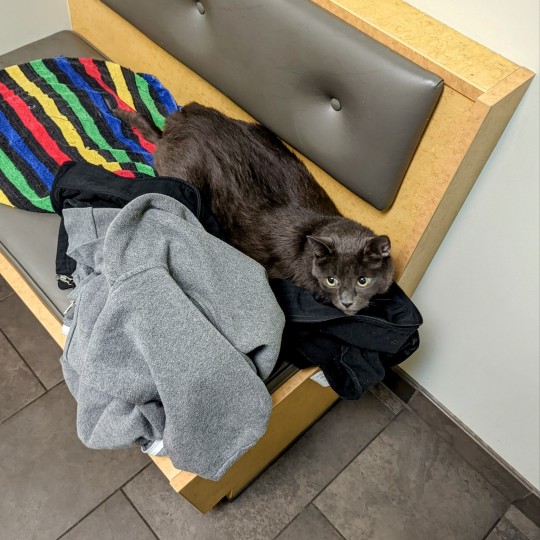
"Under" my coat... except Tico couldn't successfully burrow under, in part because he was too busy keeping an eye on us to look at what he was doing. So he ended up on top of it. (Winter was still in her carrier at this point.)
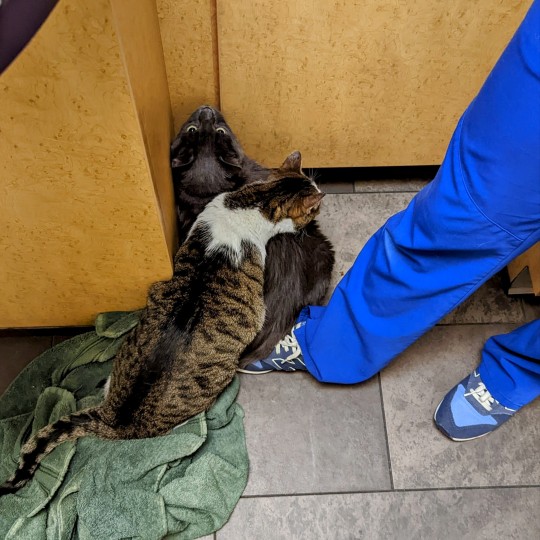
On the vet's foot, for some reason?? She was surprised.
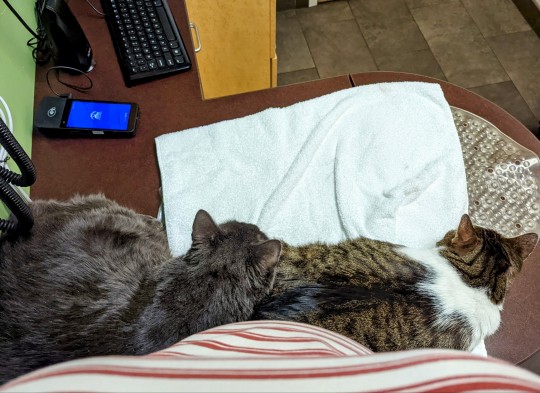
Attempting to meld with my torso, while also pancaking down against the exam table as much as possible. They spent most of the hour this way.
(Not pictured: an unknown spot in my house, where crafty Bennet managed to successfully stay hidden the whole time.)
We've been home a few hours now, and both patients are considerably more chill.
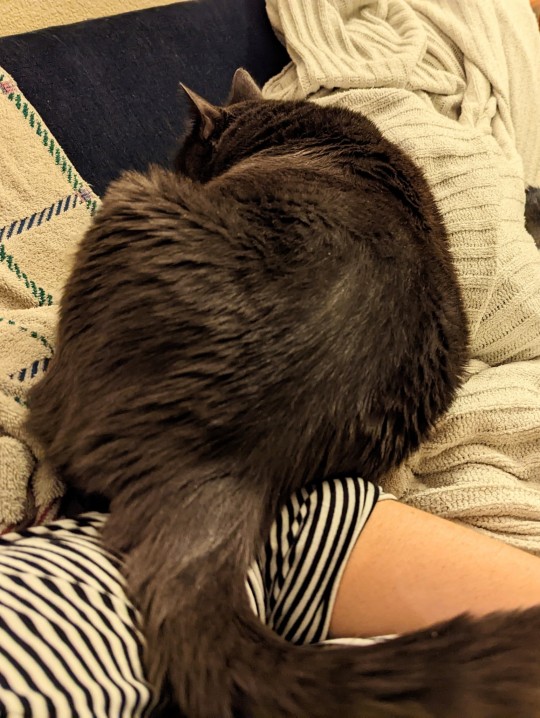
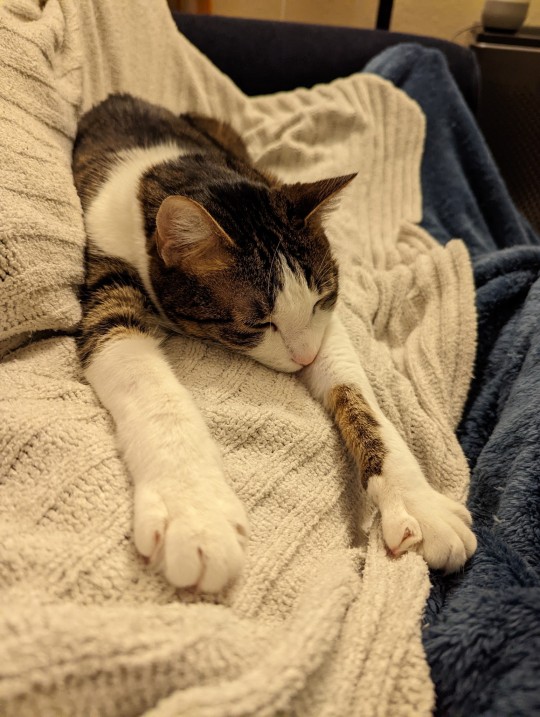
(Bennet has yet to emerge.)
#cats#toasty's adventures in unexpected feral kittens#little kitty fantastico#little kitty winter#little kitty bennet#(not pictured)#vet visits are so hard#we haven't been in five years#and we literally spend a couple weeks preparing for today#and used drugs and all the other tricks#bennet was Not Having Any Of It though#but we consider that an acceptable outcome#tico was the one who most needed to go#he might have diabetes and he has a heart murmur too apparently#they're running a bunch of tests and we'll know more tomorrow
55 notes
·
View notes
Text
There is a pro-transgender Labour revolt against health secretary Wes Streeting. You can sign the letter.

Labour health secretary Wes Streeting has continued the transphobic policies of the previous Conservative government. Now Labour members have published and open letter anyone can sign.
Wes Streeting has said:
“This ban [on puberty blockers] brings the private sector in line with the NHS. We are committed to providing young people with the evidence-led care that they deserve”.
Evidence shows that blockers are of great help to young trans people, as it gives them some breathing space before puberty changes their bodies in traumatic ways.
Streeting is either lying about what medical research on trans people says or he has not done his homework. As a gay man he should know how oppression and erasure work.
The letter states:
International evidence shows that puberty suppressing hormones are a safe and effective way to temporarily pause a young person’s puberty, giving them time to consider their options for transition.
Much of the concern around their use stems from the idea that those who take puberty blockers go on to use cross sex hormones as part of their transition.
We do not think that trans young people growing up to be happy and healthy trans adults is a bad outcome while rates of de/retransition are exceptionally low.
Rather than honouring Labour’s manifesto commitment to “remove indignities for trans people who deserve recognition & acceptance,” you have decided to strip trans young people of their bodily autonomy, undermining important medical principles, such as Gillick Competence, in favour of upholding the Conservative approach of politicising the lives of trans people.
Even the widely discredited Cass Review does not go so far as to recommend the criminalisation of puberty blockers for trans young people.
You can read and sign the letter here.
See also:
Wes Streetings Tweet: An Analysis #BWOT
Wes Streeting sparks fury after defending ban on puberty blockers for trans kids
The World Professional Association for Transgender Health with severe critique of the UK Cass review on transgender youth
By Jack Molay.
4K notes
·
View notes
Text
pain and suffering (finally caught up with noragami)
#x#hnnnnng .______.#the foreshadowing... the way it was all so clear from the very beginning... this really is the only way it could've happened...#and you know. if it's the story of how hiyori iki became shiro. then so be it.#yes it's tragic but every possible outcome would be sad and tragic! like what's the alternative here#let's say her death can be undone (maybe heaven can undo everything that happened in father's 'world' once he's defeated)#and hiyori's condition is fixed and their ties are severed so then what?#she goes on living her life and never sees yato and yukine again and always wonders what that emptiness in her chest is?#she made a promise to never forget them so doesn't she get a say in it?#what's the other possibility here. she doesn't forget and continues being involved with both worlds?#how is she gonna live a normal life?#how would that be fair to her family future husband kids etc if her heart is with someone else and even her plaquette is tied to yato's?#idk something that bothers me about the entire hiyori debate is that people don't really consider what /she/ wants#tbh i think ever since she heard her grandmother's words she had made up her mind#and i don't mean like. that she wanted to die. she definitely wanted to live#but she was also willing to accept death. she wasn't afraid.#and that's why it makes a lot of sense if it's shiro telling the story#that she learns her name and gets her memories back but it doesn't corrupt her because she was willing to give her life for yato either way#don't get me wrong her death is still very sad and tragic but... the more i think about it the more it seems like the cleanest conclusion#to her character arc... especially since we know her existence will continue as shiro and this is the only way for the main trio#to stay together and even get something like a 'happily ever after' </3#tbh i just hope yato doesn't blame herself for her death :< it's not his fault. hiyori made her choices she /knew/ the risk she /knew/#the condition her cord was in she /knew/ her body was getting cold... and it's not her fault either it's all on father#and yato did the best thing making her his shinki to spare her from what father would've turned her into :<#ah idk we'll just have to see where it all goes from here...
1 note
·
View note
Text
i mean i am of the general opinion people should learn more about the world wars, not necessarily for the facts, but to realise that official, professional opinions, which agree on all the known facts, and which do not contradict observed reality in any known way, can still be mutually exclusive and deeply contradictory to other official, professional opinions, which fulfill those exact same requirements
#a study in sex drugs and french#a grievance against society#you get the whole spectrum of opinions#from 'the person making this decision was qualified to do so and made the perfect decision and they did nothing wrong'#to 'the person making this decision was utterly unqualified and made the worst decision based on all of the mistakes possible'#and the truth is probably somewhere in-between#but that's not the important point#the important point is we don't know#a lot of people think there are absolute thruths to history#we know who did what and when and where and to whom#we have all the information needed now#but we don't! and we need to accept that#just consider the difference between heroic sacrifice and reckless waste of life#yeah the material outcome is the same either way#but they're still two entirely different things#and we might never know which one it was#and the decision which one to use to describe the situation#will affect how the information is taken in#and will affect the understanding and reaction to it
0 notes
Text
⏰⏳🕒How to predict timing with tarot cards?
©tarotfairy0919 - all rights reserved. do not copy, translate, alter or repost my work.
Please REBLOG if you find this information useful! ༄˖°🪐.ೃ࿔*
While Tarot cards can provide insights and guidance on a situation, predicting precise timing can be difficult as the Tarot operates on a more intuitive and spiritual level rather than a literal timeframe.
It's important to remember that Tarot readings are meant to provide guidance, not concrete predictions. Trust in the process and allow the messages from the cards to unfold in their own time.
If timing is a crucial aspect of your question, consider seeking additional clarification from the cards or a professional Tarot reader.
Traditional tarot timing correspondences
WANDS - rapid action(hours to days), noon and spring
SWORDS - quick but not as fast as wands(days to weeks), morning and spring
CUPS - somehow slow( weeks to months), evening and autumn
PENTACLES - the slowest of all(months to years), midnight and winter
Note: If you want me to create a deck regarding timing feel free to send me an ask!
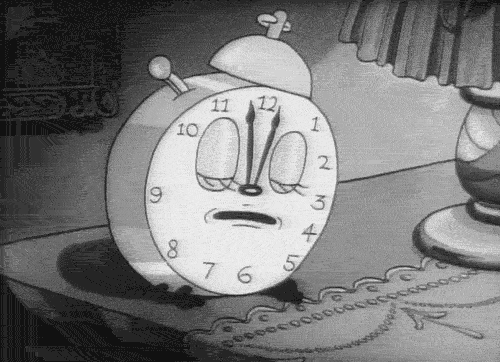
you can do it in a calendar spread and look for the first card that is the most representative(THE LOVERS, 2 OF CUPS, 9 OF CUPS - wish card, any of THE KNIGHTS, ACE OF CUPS) - in case if you wonder if a relationship will appear in future
the first card will represent the current month when is possible for the relationship to start/appear
if 2 of Cups is the 5th card - a relationship will appear in 5 months from now
you can also look at what sign the card represents and the relationship can start in that sign period
─── ⋆⋅☆⋅⋆ ───── ⋆⋅☆⋅⋆ ───── ⋆⋅☆⋅⋆ ──
Answer to “When?’’ Question According to Major Arcana Tarot Cards
The Fool - When you make a leap of faith, spontaneously
The Magician - When you are ready to manifest it, quickly
High Priestess - You already know when, trust your instinct, night, a new moon; Unrevealed
The Empress - When factors align, 9 months
The Lovers - When you make a decision
The Chariot - Fast moving card / When you are determined
Strength - When you believe in yourself
The Hermit - Slow moving card/ After a period of self reflection/solitude
Wheel of fortune - When the divine timing is ready, anytime & without notice, soon
Hanged Man - Stagnant, this situation will require your patience. When you change your perspective or surrender and accept, undetermined
Temperance - Things may happen slowly. Patience and moderation
The Tower - Suddenly, unexpectedly, abruptly, immediately
The Sun - Summer, a year
The Star - When you believe
The Moon - A month
Judgement - Winter, stormy weather
The World - When the divine timing is ready, slowly
Lots of lower numbers - long time
8, 9, 10 cards - rapid conclusion
Using the numbers of the minor arcana it can be an indicator of when an approaching event may be likely to happen. By using a simple mathematical formula, we can arrive at a projection.
。゚•┈୨♡୧┈• 。゚number + suit = timing
For example, if the outcome card is the 2 of Wands, we could deduce the following: 2 + days = 2 days
This may suggest the event may happen in two days, or that it will last for two days.
─── ⋆⋅☆⋅⋆ ───── ⋆⋅☆⋅⋆ ───── ⋆⋅☆⋅⋆ ──
Asking the right question & Reading the cards first:
By focusing on more specific questions and considering the potential story or sequence of events, you can gain deeper insights into the situation.
When encountering multiple reversed or negative cards, it could indicate obstacles or challenges that need to be addressed before progress can be made. It's all about understanding the nuances and layers within each reading to uncover the underlying messages and guidance.
─── ⋆⋅☆⋅⋆ ───── ⋆⋅☆⋅⋆ ───── ⋆⋅☆⋅⋆ ──
Minor Arcana Timing Methods - Season Method
Each suit in Tarot is indeed associated with one of the four elements, which in turn correlates to one of the four seasons:
Wands (Fire): Associated with the element of Fire, symbolizing passion, energy, and creativity. This suit corresponds to the season of Spring, where growth and new beginnings are prevalent.
Cups (Water): Representing the element of Water, Cups signify emotions, intuition, and relationships. This suit is connected to the season of Summer, reflecting nurturing and deeper emotional connections.
Swords (Air): Aligned with the element of Air, Swords signify intellect, communication, and mental clarity. This suit is linked to the season of Autumn, where critical thinking and decision-making are emphasized.
Pentacles (Earth): Tied to the element of Earth, Pentacles represent material aspects, stability, and abundance. This suit correlates with the season of Winter, symbolizing practicality, grounding, and financial matters.
The number method in tarot can provide additional insights into timing within a reading.
By considering the numbers on the cards drawn, you can make predictions about when an event may occur.
For instance, if you draw the Six of Wands and the Six of Cups in response to a question like "When will I find love?" the presence of the number six in both cards could indicate a time frame ranging from 6 days up to 6 months for the event to unfold.
This method adds a layer of specificity and helps in understanding the potential timing of future events based on the cards drawn.
─── ⋆⋅☆⋅⋆ ───── ⋆⋅☆⋅⋆ ───── ⋆⋅☆⋅⋆ ──
Major Arcana Timing Methods: Zodiac Sign Method
Astrological correspondences can also be used to predict timing in tarot readings, particularly with Major Arcana cards. Each Major Arcana card is associated with a specific astrological sign or planet, providing insights into timing and potential events.
By understanding the astrological correspondences of the Major Arcana cards drawn in a reading, you can gain insights into the timing and potential influences of celestial energies on the situation at hand.
The Fool: Aquarius (January 20-February 18)
The Magician: Gemini (May 21- June 20)
The High Priestess: Cancer (June 21-July 20)
The Empress: Taurus (April 21-May 20)
The Emperor: Aries (March 21-April 20)
The Hierophant: Taurus (April 21-May 20)
The Lovers: Gemini (May 21-June 20)
The Chariot: Cancer (June 21-July 20)
The Strength: Leo (July 21- August 20)
The Hermit: Virgo (August 21- September 20)
The Wheel of Fortune: Four fixed signs (Taurus, Leo, Scorpio, Aquarius)
The Justice: Libra (September 21-October 20)
The Hanged Man: Pisces (February 21-March 20)
The Death: Scorpio (October 21-November 20)
The Temperance: Sagittarius (November 21-December 20)
The Devil: Capricorn (December 21-January 20)
The Tower: Scorpio and Aries (October 21-November 20) (March 21-April 20)
The Star: Aquarius (January 21-February 20)
The Moon: Pisces (February 21-March 20)
The Sun: Leo (July 21- August 20)
The Judgement: Scorpio (October 21-November 20)
The World: Capricorn (December 21-January 20)
ʕ•ᴥ•ʔノ♡ ʕ•ᴥ•ʔノ♡oopsie you already reached the end ʕ•ᴥ•ʔノ♡ʕ•ᴥ•ʔノ♡
#tarotcommunity#tarot reading#tarot witch#tarotblr#tarot#tarot community#daily tarot#tarot cards#tarot art#learn tarot#tarotonline#tarotista#tarotscope#tarot deck#please reblog#ayda's tarot notes#tarotfairy0919#tarot for beginners#free tarot
464 notes
·
View notes
Text
Did Laios have a plan
... when he made his deal with the Lion? How much of it was intentional and how much of it was out of his control?
Well. If I'm being honest I don't really want to try and provide a definitive answer to that question, because I think the ambiguity is, itself, part of the story. I've gone back and forth a few times myself, and I don't think either category - "fully intentional" or "fully coincidence" - is entirely true.
That being said, I would like to point out a few things that I've seen taken for granted as true. Things that, imo, are much more about the character's perspective, or about what the character WANTS people to think (well, that's really just the Winged Lion).
Consider this not exactly an argument for "Laios masterminded everything from the start and saved the world with his cunning," but more... "Laios considered what he was doing more than people give him credit for." Make sense?
Alright then, let's go:
So to start with, I want to show every time (that I could find, at least) that the question of 'does Laios have a plan' gets brought up. This is specifically after his Ultimate Monster Form is revealed, to be clear - the question isn't about if he has a plan in general, it is if he has/had a plan when he made this specific deal with the Lion.
Here they are:
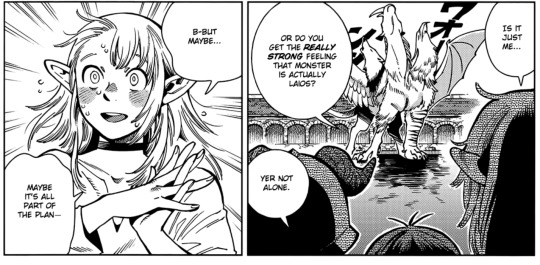
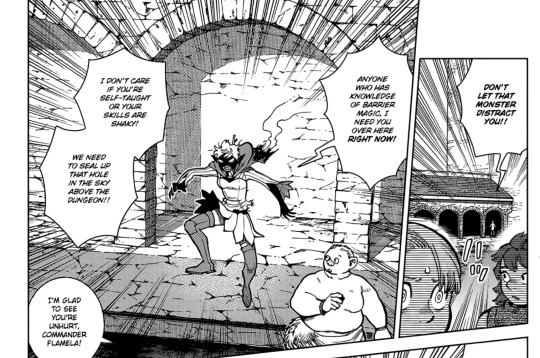
-

-

You'll notice, in all of these instances, there never really is an answer given to the question. Either because there is no way to get one, or, with Kabru at the end there, because he explicitly doesn't let Laios answer. There's even a bit of an arc here: we start with a sort of desperate 'I've mostly given up but maybe this isn't as bad as it looks,' then get a more optimistic 'maybe we really are saved,' and finally end on 'it all worked out in the end, so we maybe don't need to know.'
But, as much as there is some genuine growth in Kabru's 'accept the outcome, rather than dissecting the truth,' I also think it says a lot more about him than about Laios. Kabru is the one trying to handle his questions and his uncertainty - as he said, he wants to confirm his judgement of character. He wants to feel like he had control over things.
And he lets that go! But he also doesn't actually get the truth, either, and his implied assumption here (that Laios, the wide-eyed monster-lover, probably just followed his desires), still relies on his judgements and assumptions about Laios.
But okay, these bits are all focused on the characters theorizing about Laios. How about we look at the character who actually tells us the facts ("facts"): the Winged Lion.
The Winged Lion has quite a bit to say about Laios and his monster form.
He says that Laios hates humanity, and would rather be a monster

I've talked about this a bit already, but the Lion makes a lot of claims and assumptions about Laios that aren't necessarily true.
First of all, let's just make sure we clearly establish that the Lion is being manipulative here. That may seem obvious, but it's important to understand that there is a difference between 'the truth' and 'a version of the truth specifically framed to prey upon your deepest shame and insecurities about what you really want.'
To point out a few quick-and-dirty contradictions here:
If Laios really hated all other humans, then the Lion wouldn't hinge so many of his other arguments on Laios' love for Falin and his friends.
the Lion claims that Laios "[doesn't] even care enough about the future of [the] world to express an opinion about it," even though Laios has literally expressed opinions on what he wants for the world, to the Lion's face.
In general, the Lion does not make a distinction between urges and choices (see, for instance: him using Marcille's subconscious fear of the canaries as a way to keep her from stopping the monsters from attacking in chapter 86).
I'm not saying there is not a piece of truth here, but also... we are not our darkest thoughts, and we especially are not those thoughts as defined by someone who wants to hurt and control us.
But let’s move on to the stuff the Lion claims about Laios once he has been turned into his monster form.
2. He says that (or rather, acts like) Laios is under his control
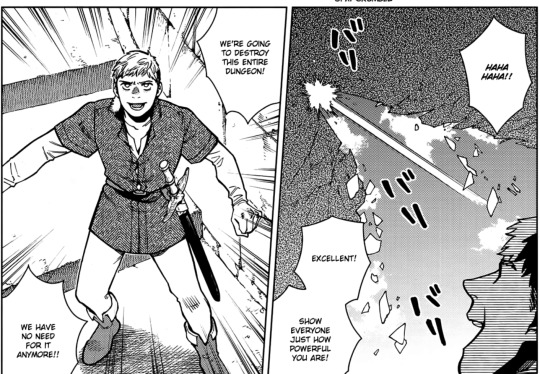
The Lion really enjoys grandstanding about how Monster Laios is an ultimate tool he has control over. He gloats about making Laios fight the others, and has him smash through the magical barrier.
But smashing the barrier is kinda the only thing that Monster Laios actually does for the Lion. He doesn't attack anyone. He doesn't hurt his friends, despite Chilchuck thinking that Laios has "turned completely into a monster." And he certainly doesn't simply let the Lion go through with his plan to eat everyone.
This barrier smashing is actually an interesting and odd thing for Laios to have done specifically, so remember that one. I'll come back to it later.
But, yeah, to the original point... despite the Lion's dramatics, all that Monster Laios does is pose, smash up a magic barrier, and then eat him. Not exactly under his control.
AND SPEAKING OF EATING THE DEMON...
3. He frames Laios attacking and eating him as thoughtlessly violent

This one is pretty funny to me, and the Lion keeps it up for the whole scene. I'm not sure how much of this is his genuine understanding of the situation, and how much is him intentionally framing things in the most insulting manner, but like... truly. The ego involved in this. To see someone who has, multiple times, tried to stand against you - someone who has literally wished for your non-existence, to your face - to see this person attack you, specifically, and have your first reaction be 'huh, I guess he's a reckless weirdo to the core???'
Incredible stuff.
And this part, too:
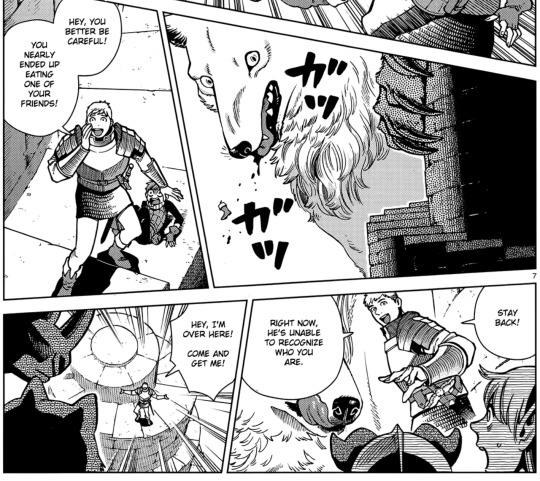
He claims that Laios can't recognize anyone, that he's out of control. And yet, the Lion is the only person that gets eaten here. He is Laios' singular target.
Hell, Laios even specifically attacks one of the bodies that is actively hurting Chilchuck. I don't know if that was entirely intentional on Laios' part, but I do think it's notable.
The Lion torments Laios' friend, and when Laios does something that interrupts that action, the Lion reframes it as unhinged violence. I don't know, there's something here about the way that cruel people only talk about the things people do to resist them as violent, and ignore the violence that causes such resistance in the first place.
In any case, the main point is that the Lion insists on treating Laios like an unthinking animal during this fight, despite the fact that Laios is clearly trying to accomplish something here.
And what exactly is Laios trying to accomplish? Well, the Lion isn't entirely wrong. Laios is trying to eat something. He tells us as much.


And truly, everything Laios does as a monster points to this. He had a goal. And he accomplished it.
Let me back up a moment. I need to explain smashing the barrier.
So, Laios first starts considering how to kill the Lion when he is confronted with the fact that his only other choice would be to kill Marcille. Immediately and entirely discarding that solution, because of course he does, he tries to wrap his head around what defeating the Lion would even look like.

He clearly continues thinking about this, as a nearly identical conversation happens a few chapters later, when Laios is once again told that killing Marcille is the only way forward.
Only, this time, he's started to come up with an idea for how to do this impossible thing.
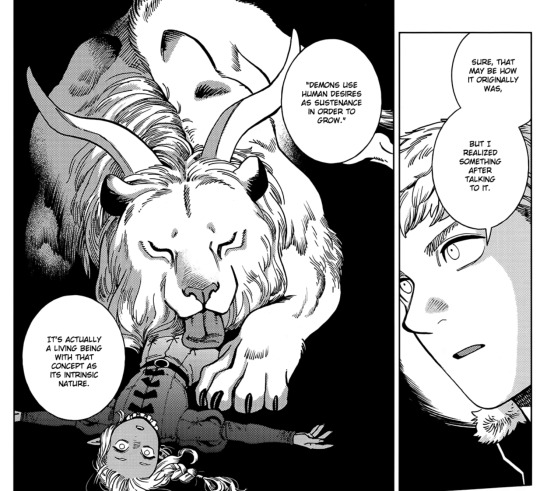
Harkening all the way back to the Living Armor chapter, Laios draws on the same lesson - if the Lion has made itself part of the world, if it has made itself into something alive, that means he can kill it. And eat it.
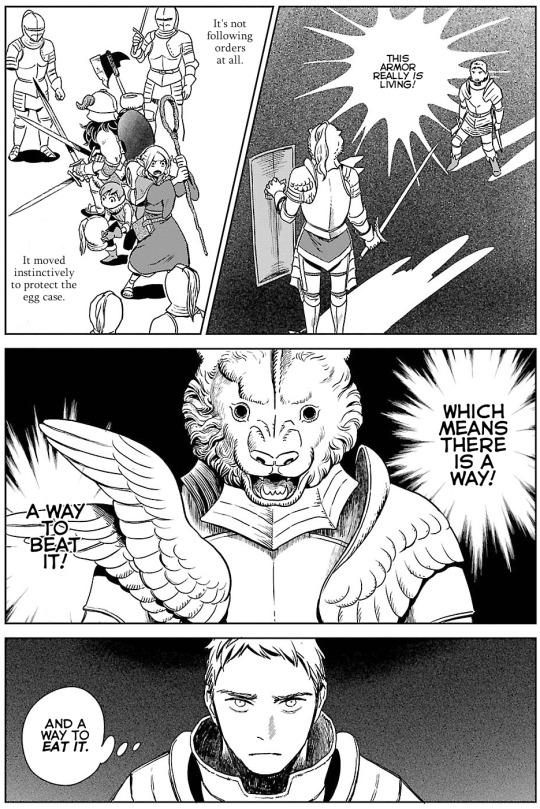
But there's an important extra detail to this. If he's going to try and kill (and eat) the Lion, he needs to strike when it’s vulnerable. He needs to strike when it's eating.
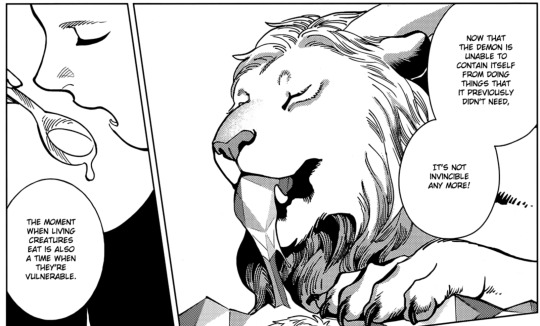
This is why he smashes through the barrier. Again, nothing else he does as a monster really benefits the Lion. He doesn't attack anyone else. The only command he obeys is to smash the barrier. Because the Lion has to think he has won for Laios to be able to eat him.
Beat him. For Laios to be able to beat him.
The question of why Monster Laios wanted to eat the Lion is, I think, the most ambiguous part. Was he curious? Hungry? Did he fight for his own life, for his friends, or for all of humanity? Did he know how to win because he had planned everything from the start, or because he was driven by an unquenchable instinct to do whatever it took to survive?
I don't know that it is possible to say for sure. But I do know that the Lion underestimates Laios, through it all. He underestimates Laios as a human, and he underestimates Laios as a monster.
And in the end, after he is bested, even then I don't think the Lion ever gets Laios. I don't think he understands how much Laios means his words about the Lion being burdened by hunger...
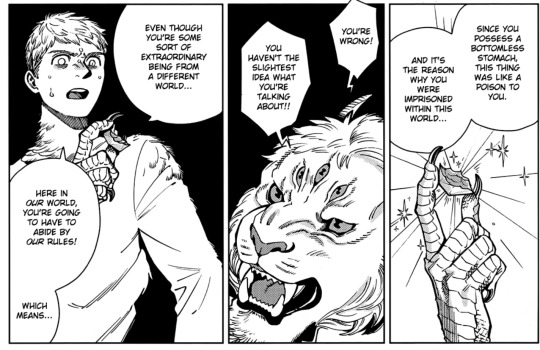

or what Laios cares about most...


or what meaning there is in life, for him.


So I don't buy what the Lion is selling about Laios, generally speaking. I don't buy that Laios didn't ever know what he was doing, and I don't buy that he was nothing more than a hungry beast.
Well. I mean. He was a hungry beast. But he was a more than that too. He was the Devourer of All Things Horrible. And he didn't just happen into that title by chance.
#dungeon meshi#delicious in dungeon#laios touden#winged lion#dissecting how the Lion's negging works is a great exercise in understanding manipulation honestly#dungeon meshi spoilers#dunmeshi analysis
1K notes
·
View notes
Text
Bet
Eustass Kid x GN!Reader
Kid's all out of chips, but he finds something else he can wager against you
+++++++++++++++++++++
“Hah! I win again!” you threw down your winning hand amidst the groans and boos of other crew members as they tossed their losing cards back into the center of the table. Taking the chips greedily you snickered, noting the pouty look of displeasure on your captain.
“Looks like you’re out of chips Kid,” you said with a sly grin. Kid scowled further, brow furrowing under his goggles. Killer’s shoulder shook with a silent laugh as he started to deal out the new hand of cards. You all took your hands, and as Kid studied his cards, his expression quickly changed into something more sinister.
You quickly noticed this change, “…Got good cards Captain?”
Kid huffed, placing his hand face down with a smirk, “Wouldn’t you like to know?”
Your eyes narrowed, “Well it’s too bad your all out of chips then, isn’t it?”
Kid jerked, his mind quickly running as he surveyed the table. Finally, he leaned his arm forward, aiming a cocky grin in your direction.
“Okay then, what do you want? I can bet something other than chips.”
You leaned back in your chair, pondering this before a sly smile pulled at your lips.
“Okay Captain, if I win…I get your jacket.”
This was met with a chorus of ooohs as Kid’s face fell, “Why do you want my jacket?” He subconsciously pulled the textured red coat closer around him.
You shrugged, “It’s cozy.”
Kid studied you hard for a long moment before he finally spoke, “Fine,” he leaned back into his chair with a creak, “But! If I win, I get a kiss from you.”
This brought more ooohs and chuckles from the others around you as you considered this. After a moment you stuck out your hand.
“Deal.”
Kid shook it with a firm pump, his own hand swallowing yours in his grip.
“Just don’t chicken out when you lose,” he sneered.
You laughed, taking back up your hand of cards, “I can read you like a book Captain, you have shit cards.”
Kid smirked, “We’ll see.”
As the round began, the others quickly folded, not wanting to interfere in the bet you and Kid had made and curious to see the outcome. The two of you held your cards close, eyes flicking from your hands to the other’s face, studying for any sign of weakness. After a long moment, you finally broke the tension.
“Four of a kind,” you laid down the field of red diamonds you’d collected with a flourish.
Kid let out a long slow exhale as everyone waited to see his hand, finally he threw them down.
“Straight flush,” he said in a dark voice, smirk pulling at his red lips.
You blanched, shit he actually had you beat. Kid leaned back, crossing his arms with a satisfied grin on his face as the others whooped.
You scowled in response, chugging the remainder of your drink before standing abruptly from the table.
“Aw come on,” Kid called as you left your seat, “Don’t be a sore loser,” you made your way past the others in their seats as Kid continued, “No need to get all shy now-“
He stopped abruptly as you approached him, threading your fingers through his red hair and forcefully tilting his head back up to face you. Before he could even blink, you descended, lips pressing against his, swallowing the surprised little gasp he gave. His eyes were wide as you pressed against him, lips moving gently before teasing your tongue against him. With a throaty groan, Kid felt his eyes flutter shut as he accepted you into his mouth, tongue dancing along his as he thrust his face forward to feel more of you. His skin broke into goosebumps as you devoured him, the tight pull against his hair only making him harder, and then just as suddenly you pulled away releasing him. Kid’s face trailed blindly after yours, already searching for that delicious warmth as he cracked his eyes open.
You swiped a thumb along your lips with a coy smile and heavy-lidded eyes boring into his and Kid felt his breath hitch.
“Well? Are we even now?” you asked.
Kid managed to close his gaping mouth as he swallowed thickly, giving a dumb nod.
“Good, I think I’ll call it a night then,” and with that you left the group.
Kid sat there, feeling the intense heat that was crawling across his face before he shortly rose as well.
“I gotta go,” was all he said as he marched off towards his own quarters to take care of the growing problem that was starting to tent his pants.
++++++++++++++++++++++++++
Tag List: @fanaticsnail
#mywriting#my writing#drabble#eustass kid#gn!reader#kid x reader#kid x you#eustass kid x reader#eustass kid x you#little spicy#but mostly fun#killer#op#one piece#fanfiction#op killer#fluff
297 notes
·
View notes
Text
something I find really interesting about hannibal’s character is how he uses people’s expectations and ingrained assumptions to hide himself. no one suspects he’s a serial killer because he doesn’t present as one. he’s elegant and refined and isn’t cruel to animals. he’s highly sophisticated, a polyglot and has a deep admiration for beauty and life. he appreciates saving lives just as much as he appreciates ending them. in fact, this particular aspect of his character is partly why it takes will the entirety of s1 to accept hannibal’s true nature. will saw hannibal save abigail and accompany her to the hospital in apéritif and he also saw hannibal save a man’s life by performing emergency surgery and taking over the operation at the end of sorbet.
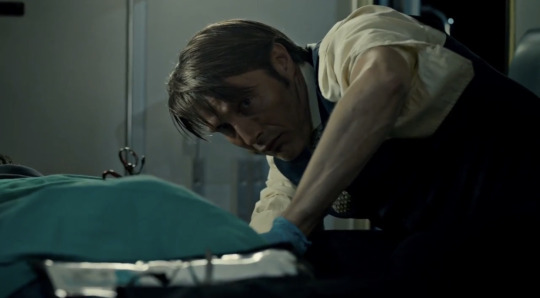
this moment in particular is interesting because of how it’s framed to make hannibal look almost godly from will’s point of view:
1) hannibal is positioned immediately higher than will due to being in the ambulance, meaning will is looking up at hannibal, while hannibal is looking down on him
2) hannibal is standing under a bright light as he works to save this guy’s life, while will is standing in almost complete darkness
3) the usual orchestral, classical music is playing in the background, emphasising the apparent “holiness” of the act and framing hannibal as some sort of saviour
the impact of this scene is even more potent when considering the context of the rest of the episode, since will has already stated that the ripper is not the type to save people or enact mercy on anyone. his style of murders doesn’t suggest this characteristic whatsoever, and although will’s assessment is correct, hannibal’s personality and overall demeanour doesn’t match what we’d imagine a person like that might look like. I think will is confronted by this as well, because even if hannibal’s surgical skill means he matches the ripper’s profile (which makes him a valid suspect) his actions contradict will’s image of the ripper, while simultaneously affirming it:

it’s difficult to reconcile these facets of hannibal’s character. it’s inherently contradictory and defies our cultural expectations. nonetheless, hannibal’s inclination to save people is sometimes more insidious than his murders. he doesn’t save people out of altruism, he does it because he thinks he’s superior and enjoys deciding outcomes. he doesn’t view himself as insane, he views himself as god. this is most aptly explored in takiawase, through the acupuncturist/beekeeper killer. here we see a murderer who confesses that she killed a man to quiet his mind, and tells jack that it’s beautiful that she managed to protect him and her other patients. this is one side of hannibal’s character, the one who’s a doctor and therapist and sees death as a cure from disease, even if the ‘disease’ itself is literally just discourtesy. it’s ultimately an act of power.
and yet in this same episode he flips a coin and saves bella on a whim. this of course is framed to others as an act of mercy, however the reality is he took bella’s power away in an act disguised as kindness. once again, he hides in plain sight. this is the other side of his character, and it’s just as deadly.
it’s still about power.
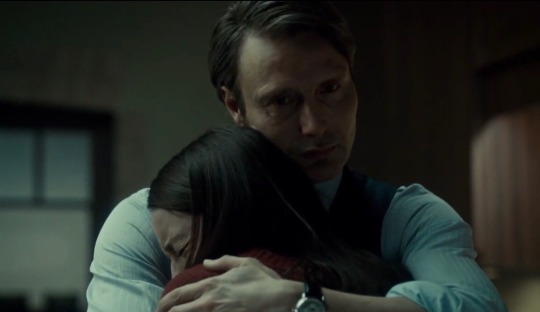
but we don’t associate acts of mercy with monstrosity. when hannibal comforts abigail in trou normand we question whether he’s as bad as we think, because what negative connotations are tied to paternal tenderness? we miss that hannibal is fostering dependency, that he literally looks dead in the eyes as he holds her, and that he blatantly just told us that he’s using abigail to manipulate will:

hannibal often does this actually. he either directly says what he’s doing or suggests that he’s the culprit (often through cannibal puns, as we know) but no one ever interprets him correctly because doing so would contradict the image he’s carefully constructed for himself. it would cause too much dissonance.
and what’s fascinating is that on a subtextual level this is largely what the show is about. the story is an exploration of societal roles and the struggle to fit into stiff categorisation and expectations. will parallels hannibal in this regard because he’s desperately trying to repress his identity by taking on certain roles. and the audience is lured by this persona the same way the characters are lured by hannibal because will defies our understanding of certain tropes. on a genre level, will assumes the detective archetype, meaning we are primed to think he’s inherently good. when we see him say he wants to save people we believe him, even though he often only does so to prove to himself that he’s a good person. will is indeed righteous, a characteristic we often view positively, however he’s violent, wrathful and actively enjoys murder due to how powerful it makes him feel. he’s not dissimilar to hannibal, we just don’t see this straight away because doing so would disrupt our understanding of good and evil.
will hides the same way hannibal does, except will hides from us as well
#ghostie once again goes on a tangent#but it’s so !! I really love how the show fucks with everyone#and uses our expectations to do it#even on a narrative/genre level#the key to unveiling it is letting that conditioning and urge to categorise everything go#also wow I’m back to writing meta hello there#nbc hannibal#hannibal#will graham#hannigram#hannibal meta#ghost speaks
3K notes
·
View notes
Text
❝ꜱᴏᴜʟꜱ ᴛᴏ ᴄʀᴜꜱʜ❞ — chapter three | coriolanus snow

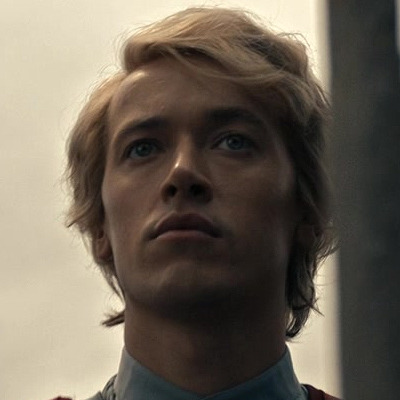
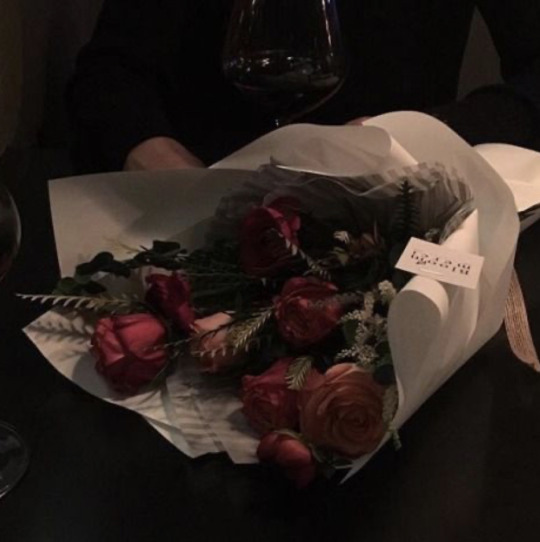

「ᴡᴀʀɴɪɴɢ:」 NSFW | minor character death, Coriolanus Snow is his own warning
「ᴘᴀɪʀɪɴɢ:」 young! Coriolanus Snow x fem! Reader
「ꜱᴜᴍᴍᴀʀʏ:」 Coryo finds out the consequences of his actions and finds one of his friends dead
「ᴀ/ɴ:」 third chapter is here!! Do remember to give feedback, thank you!!
beta read:: @nowitsmissing <33
series masterlist | navigation | previous chapter


According to Coryo, Dean Highbottom deserves to be punched. Coriolanus truly wishes he could punch that man's face and break his teeth in the process.
As soon as he entered the classroom, with you in tow. Highbottom doesn't waste a second to praise your insight into welcoming the tributes at the zoo and how you acted in front of the cameras. Creating the very spectacle they had been aiming for. Snow was fuming because he was sure it was because of his songbird, not his soulmate that the views had gotten up.
But, he doesn't think Mr. High As A Kite cares. Coriolanus almost thought he wouldn't even get any attention, neither positive nor negative. He was willing to accept that outcome considering the fact he perhaps broke several rules being inside the cage along with the tributes.
He was wrong.
‘Three demerits and you will be expelled.’
And he officially has his first demerit, on his perfect darn record. He opens his mouth to speak against it-
“Snow falls down on the cage.
It falls down on the cage
But it landed…” Dr. Gauls’ voice echoes around the classroom as she walks down the stairs to Coriolanus level.
“On stage,” he replied, his face nonchalant but his hands fisted on his lap, hidden from view. He had an urge to kick at the table, his mind reeling over what if Dean Highbottom removed him from the games. Would that mean he will be disqualified from the Plinth Prize?
He can't have that. He can't.
Before his mind spirals into a panic attack, dr. Gaul steals his attention with her words.
“You're good at Games,” she said, “Perhaps one day you'll be a game maker like me.” Coriolanus Snow couldn't possibly think of a future in which he's a gamemaker, he never thought of it as a real career. Nothing of his interests nor challenging enough for him. Of course, he doesn't say his thoughts out loud.
He doesn't reply at all, he doesn't have to because Dr. Gaul asks him a question. What are the Hunger Games for? There's no true answer to that. Something so cruel, something so horrible. There's no way to justify that with the truth. Lies perhaps, lies he was taught in the textbooks.
“They’re to punish the districts for their uprising,” he said, only to be replied with “Dull, dull, dull,” by Dr. Gaul.
“Why the games?” She asked again. And Coriolanus had no answer. Because there were plenty of ways to punish the districts. Starvation. Bombing. Public execution.
Why the games?
Coriolanus Snow had no answer and Sejanus Plinth took over instead. As usual, he spewed about the wrongness of the games. The words that will go one ear in and another ear out. Dean Highbottom butts in the discussion as well, talking about how the game had run its course.
Coriolanus can't have that, he can't even fathom the thought of the games gone and in return losing his chance of winning. Coriolanus stands up, gaining the attention of his peers and authoritative figures alike with a daring but simple sentence.
“Dean Highbottom is wrong. My classmates too,” he said, his voice filled with the confidence he didn't feel.
His fingers twitch, feeling the urge to touch the burned soulmate mark on his wrist as a way to calm his soul down. He did no such thing, burying the urge deep in his mind as he began to explain his reasoning.
“People need someone to root for and to root against. . .” He continues, “And if we bend a few Capitol laws, we can even get people to place bets.”
He swallowed, trying to ignore the fact that his palms had begun to sweat as he waited for a reply. After a bit, dr. Volumnia Gaul grinned. Her smile made his bones chill.
“Very well, Coriolanus Snow,” she said, her tone calm yet underneath laid excitement. “I’d like you to write a proposal of these thoughts, Mr. Snow.”
Before Coriolanus could agree to the opportunity, you jump in. You stand up, beside Coryo. Your soft voice rang in his ear and he subconsciously closed his eyes to savor your voice no matter what it said. For a moment he didn't even seem to hear what you were saying, he quickly opened his eyes, looking down on the wooden floor instead. His pale cheeks burning, praying that no one saw that.
He finally hears what you say.
“Let's not limit the Games to the Capitol. Let's unite the whole of Panem with it,” you said, your voice filled with conviction. “I am sure Dr. Gaul if you give me the chance to write a proposal too, you won't be less than impressed.”
“Very well, miss,” she said, cordially, “I will be looking forward to seeing what the star mentors have to say.”
“Do not disappoint,” Dr. Volumnia Gaul grins before taking herself out of the classroom.
✧ ▬▭▬ ▬▭▬ ✦✧✦ ▬▭▬ ▬▭▬ ✧
After a quick lunch (not, he decided to sneak food for Lucy Gray) and a plan to meet up with you in the library at night. He sets out in the Zoo with Sejanus Plinth on his toe. The rich boy carrying a whole bag of food, something Coriolanus could only dream of. While Coriolanus had some sloppy sandwich and cold cookies wrapped in a napkin.
Shamed filled his veins about the fact that in his current abilities, he could bring stolen food for his tribute. He takes solace in the fact Sejanus’ tribute refused the bacon sandwich offered to him. A satisfaction in his mind to see Sejanus being rejected by his tribute while Lucy Gray was cooperative as before.
She takes the food, giving some of it to the district twelve boy. Coriolanus frowned as he saw her share the food he bought her. He leaned into the cage to whisper, “Are you going to share everything I give you?”
Lucy Gray replied, not skipping a beat, “You think I ought to build up my strength so I can strangle him in the arena?”
Coriolanus wishes to snap at her and say yes but he knew he had to show kindness to the songbird for her to do his bidding. He takes a deep breath to calm himself down, as Lucy Gray's eyes divert to his classmate, Arachne, his classmate who was busy amusing herself with her district ten tribute.
“Hunger is a weapon in the districts,” Lucy Gray comments, “Seems like your friend here knows it.”
Coryo barely suppressed a snort as he replied, “She's not a friend. She's poison with perfect teeth.” He smiles along with Lucy Gray. He leans down to Lucy Gray's level, his fingers gripping the bars between them. He whispered, “I may have the chance to help you. Make suggestions. I might even get the chance to send you gifts in the arena. Food and water.”
Lucy Gray replied, her voice hardening with the fact that she knew there was a catch, “What's the catch?”
“You might need to sing.”
“I don't sing when I am told. I sing when I have something to say.”
Coriolanus furrows his eyebrows as he hears her response. She would rather die in the arena than create a spectacle of herself. Stupid in his opinion, to value the integrity of art over their life. He opens his mouth to convince her otherwise but then an incident happens that leaves him shaken to his core.
The district ten girl, the tribute Arachne was playing with snatched the water bottle from his peer, smashes it against the cage… and in a blink of an eye, Arachne had her throat slit.
Horror fills Coriolanus as he rushes to her side. His hands over her wound, putting pressure to stop the flow of never-ending crimson blood. He sees her eyes losing life, he almost didn't hear the gunshots killing the tribute who caused this. He cried out for help, only to be ignored. He was grabbed by the shoulder by a peacekeeper. He was dragged away, as Arachne Crane bled out in front of him.
She was dead.
The people from the district were truly animals is his last thought, as he blinks away the tears and shock and goes to his home.
✧ ▬▭▬ ▬▭▬ ✦✧✦ ▬▭▬ ▬▭▬ ✧
In the comfort of his ruined home, he had taken a shower and had dinner with his family. He listens to the warnings his grandma’am spewed and hears Tigris voice her opinion against it. He doesn't say a word in between, his fingers tracing the scar over and over again, it was the action that managed to keep him sane for the moment.
After the dinner, he begins to change his outfit. He wears a black shirt, something from his father's closet, and too-tight grey pants. He looks at his hands and imagines Arachne on them. He takes a sharp breath and watches the red fade away from his mind. He tugs at his shirt sleeve and the burned tissue comes into view.
He does so hoping that you're waiting for him in the library. Lucy Gray was a disappointment, Sejanus too. Arachne death is a disappointment too. You were the only one he could rely on not to do the same.
He pressed his lips to the scar and for a mere flash of the moment imagines kissing you instead. For a moment, he forgets you're District, for a moment you're just his and he indulges himself in the fantasy of having your soft lips against his.
Tigris breaks him from his daydream by asking, “Are you sure that she will be waiting, Coryo?”
He looks back at Tigris, his lips pulled in a smirk, his thoughts free of mourning. He covers the scar and replies,
“She was never one to disappoint.”

Next Chapter
Current taglist: @tristanswildcat @alllriseabove @sushirollie
@ppcowboyprincess @lauravanderbooben20 @captainbabybear
@linkcommercial831 @write-from-the-heart
@kodzuvk @arzua10 @frill04 @cremebruleequeen @nan-nie @xreaderandreaderinserts @shoutingcardinal @coffee-tulips-books @555saccharine @chaoticcoffeequeen @xyraphine
@blairfox04 @gisellesprettylies @livid-euphoria @fentyxmalik @buckysjuicyplums @cryinginanuncoolway @duckielikesgames @articxari @or-was-it-just-a-dream @serving-targaryen-realness @qardasngan @wendythedarling @maybankswhore @just-a-littlebit-of-everything @bunny24sstuff
@lot4ever @diannana @abaker74 @ultrav10l3nce @jjstyles @reaganswift @freyaaah-writings @marauders-wife @tallulah477 @faephoria @imheretoread @emmawasneverfound
#character x reader#x you#x reader#x female reader#fem reader#oneshot#scenario#tbosas smut#thg tbosas#tbosas fanfiction#tbosas x reader#tbosas#the ballad of songbirds and snakes#the ballad of songbirds and snakes movie#dystopian fiction#the hunger games x reader#thg x reader#thg series#thg#the Hunger Games#president coriolanus snow#coriolanus x reader#coriolanus smut#coriolanus snow#coriolanus snow smut#coriolanus snow x reader#young coriolanus snow#coriolanus x you#coriolanus snow x reader smut#coriolanus snow x you
663 notes
·
View notes
Text
The Charisma Myth: things that I liked
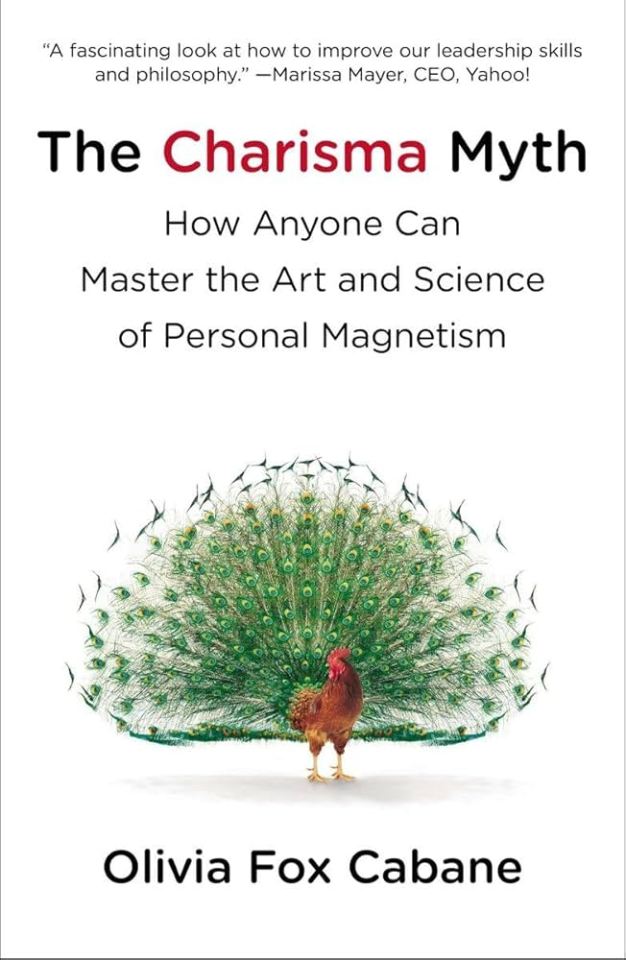
Three quick tips to gain an instant charisma boost in conversation:
Lower the intonation of your voice at the end of your sentences. Reduce how quickly and how often you nod.
Pause for two full seconds before you speak.
The very next time you’re in a conversation, try to regularly check whether your mind is fully engaged or whether it is wandering elsewhere (including preparing your next sentence).
Expensive clothing leads us to assume wealth, friendly body language leads us to assume good intentions, a confident posture leads us to assume the person has something to be confident about. In essence, people will tend to accept whatever you project.
when you can project both power and warmth together, you really maximize your personal charisma potential.
charismatic behaviors must originate in your mind. Knowing how to skillfully handle mental discomfort is even more important than knowing how to handle physical discomfort. Anxiety is a serious drawback to charisma. First, it impacts our internal state: quite obviously, it’s hard to be fully present while you’re feeling anxious. Anxiety can also lower our confidence. Anxiety, low presence, and low confidence can show up directly in our body language, as well as reduce our ability to emanate warmth.
The single most effective technique I’ve found to alleviate the discomfort of uncertainty is the responsibility transfer. Pick an entity—God, Fate, the Universe, whatever may best suit your beliefs—that you could imagine as benevolent. Imagine lifting the weight of everything you’re concerned about—this meeting, this interaction, this day—off your shoulders and placing it on the shoulders of whichever entity you’ve chosen. They’re in charge now. Visually lift everything off your shoulders and feel the difference as you are now no longer responsible for the outcome of any of these things. Everything is taken care of. You can sit back, relax, and enjoy whatever good you can find along the way.
Golfer Jack Nicklaus said that he never hit a shot, even during practice, without visualizing it first. For decades, professional athletes have considered visualization an essential tool, often spending hours visualizing their victory, telling their mind just what they want their body to achieve.
“There is good evidence that imagining oneself performing an activity activates parts of the brain that are used in actually performing the activity,” Professor Stephen Kosslyn, director of Stanford’s Center for Advanced Study in the Behavioral Sciences, wrote me. Visualization can even physically alter the brain structure: repeated experiments have shown that simply imagining yourself playing the piano with sufficient repetition leads to a detectable and measurable change in the motor cortex of the brain.
Silvia recently confided that visualization is one of the secrets to her success. Before key meetings, she’ll imagine “the smiles on their faces because they liked me and they are confident about the value I’m bringing them. I’ll imagine as much detail as I can, even seeing the wrinkles around their eyes as they’re smiling.” She visualizes the whole interaction, all the way through to the firm handshakes that close the meeting, sealing the deal.
A twenty-second hug is enough to send oxytocin coursing through your veins, and that you can achieve the same effect just by imagining the hug. So the next time you’re feeling anxious, you might want to imagine being wrapped up in a great big hug from someone you care about.
Self-confidence is our belief in our ability to do or to learn how to do something.
Self-esteem is how much we approve of or value ourselves. It’s often a comparison-based evaluation (whether measured against other people or against our own internal standards for approval).
Self-compassion is how much warmth we can have for ourselves, especially when we’re going through a difficult experience.
It’s quite possible for people to have high self-confidence but low self-esteem and very low self-compassion.
Types of charisma:
Focus: Focus charisma requires, of course, the ability to focus and be truly present. Good listening skills are nonnegotiable, as is a certain degree of patience. To develop focus charisma, cultivate your ability to be present.
Visionary charisma makes others feel inspired; it makes us believe. It can be remarkably effective even though it won’t necessarily make people like you. We assess visionary charisma primarily through demeanor, which includes body language and behavior. Due to the fact that people tend to accept whatever you project, if you seem inspired, they will assume you have something to be inspired about.
kindness charisma comes entirely from body language—specifically your face, and even more specifically your eyes. Kindness charisma is primarily based on warmth. It connects with people’s hearts, and makes them feel welcomed, cherished, embraced, and, most of all, completely accepted.
Authority charisma is primarily based on a perception of power: the belief that this person has the power to affect our world. We evaluate someone’s authority charisma through four indicators: body language, appearance, title, and the reactions of others. you’ll need to learn how to “take up space” with your posture, reduce nonverbal reassurances (such as excessive nodding), and avoid fidgeting. You may need to speak less, to speak more slowly, to know how and when to pause your sentences, or how to modulate your intonation. Look expensive.
Avoid holding a drink in your right hand, especially if it’s a cold drink, as the condensation will make your hand feel cold and clammy. Before shaking someone’s hand, whether you are a man or a woman, rise if you’re seated. And keep your hands out of your pockets: visible hands make you look more open and honest. Make sure to use plenty of eye contact, and smile warmly but briefly: too much smiling could make you appear overeager. Keep your head straight, without tilting it in any way, and face the person.
Ask people open ended questions, focus on questions that will likely elicit positive emotions. With your questions, you have the power to lead the conversation in the direction you want. In fact, even when you’re speaking, the one word that should pop up most often in your conversation is not I but you. Instead of saying “I read a great article on that subject in the New York Times,” try “You might enjoy the recent New York Times article on the subject.” Or simply insert “You know...” before any sentence to make them instantly perk up and pay attention.
Another way to exit a conversation with grace is to offer something of value:
Information: an article, book, or Web site you think might be of use to them A connection: someone they ought to meet whom you know and can introduce them to
Visibility: an organization you belong to, where you could invite them to speak
Recognition: an award you think they should be nominated for
When someone has spoken, see if you can let your facial expression react first, showing that you’re absorbing what they’ve just said and giving their brilliant statement the consideration it deserves. Only then, after about two seconds, do you answer. The sequence goes like this:
They finish their sentence
Your face absorbs
Your face reacts
Then, and only then, you answer
The next time you’re given a compliment, the following steps will help you skillfully handle the moment:
1. Stop.
2. Absorb the compliment.
3. Let that second of absorption show on your face. Show the person that they’ve had an impact.
4. Thank them. Saying “Thank you very much” is enough, but you can take it a step further by thanking them for their thoughtfulness or telling them that they’ve made your day.
It’s not just metaphors that can paint the wrong picture. Some common phrases can have the same effect. When you tell someone, “No problem,” “Don’t worry,” or “Don’t hesitate to call,” for example, there’s a chance their brain will remember “problem,” “worry,” or “hesitate” instead of your desire to support them. To counter this negative effect, use phrases like “We’ll take care of it” or “Please feel free to call anytime.”
You can deliver value to others in multiple ways:
Entertainment: Make your e-mail or meeting enjoyable.
Information: Give interesting or informative content that they can use.
Good feelings: Find ways to make them feel important or good about themselves.
The longer you speak, the higher the price you’re making them pay, so the higher the value ought to be.
If your goal is to communicate power, set the pitch, tone, volume, and tempo of your voice in the following ways:
Pitch and tone: The lower, more resonant, and more baritone your voice, the more impact it will have.
Volume: One of the first things an actor learns to do on stage is to project his voice, which means gaining the ability to modulate its volume and aim it in such a targeted way that specific portions of the audience can hear it, even from afar. One classic exercise to hone your projection skills is to imagine that your words are arrows. As you speak, aim them at different groups of listeners.
Tempo: A slow, measured tempo with frequent pauses conveys confidence.
To emanate vocal warmth, you need to do only one thing: smile, or even just imagine smiling.
Charismatic people are known to be more “contagious”; they have a strong ability to transmit their emotions to others.
The most effective and credible compliments are those that are both personal and specific. For instance, instead of “Great job,” you could say, “You did a great job,” or, better yet, “The way you kept your calm when that client became obnoxious was impressive.”
Here’s one specific—and surprisingly effective—recommendation for phone charisma, courtesy of author Leil Lowndes: Do not answer the phone in a warm or friendly manner. Instead, answer crisply and professionally. Then, only after you hear who is calling, let warmth or even enthusiasm pour forth in your voice. This simple technique is an easy and effective way to make people feel special. I recommend it to all my business clients whose companies have a strong customer service component. The gains in customer satisfaction are impressive.
Charisma takes practice. Steve Jobs, who appeared so masterful on stage, was known to rehearse important presentations relentlessly.
Retain at least a certain measure of equanimity. Most charismatic leaders are known for their ability to remain (or appear) calm even in the midst of turbulent circumstances.
#Book review#charisma#challenge#c suite#powerful woman#ceo aesthetic#productivity#that girl#balance#getting your life together#personal growth#strong women
281 notes
·
View notes
Note
Some of this might sound intentionally hostile in text and I apologize.
I'm saying this as an abuse survivor mind you - don't throw "abusive ships" under the bus so easily - at least, so long as they're not actually glamorizing the abuse. I lived that irl and I personally find someone overcoming it, slowly having enough of that bullshit and getting out over time, and the other person having to wipe their own butt for once after they've made the damn mess, very refreshing. Maybe that's not a ship in the traditional sense. It's no happily ever after bc it shouldn't be, but I find stories like mine shyed away from so often because even the portrayal gets considered a "canon ship". ... that's just how media works now, I guess? I very rarely See a fictional relationship not called a ship in literally any context now so that's the definition I'm running on.
I wish more people were willing to portray the hardships of finding acceptance outside of "whoever you can find will accept you" very much, and finding the better things after. I wish people weren't terrified out of portrayimg situations like mine.
Jessie.. is not a good person in canon. You expect me to believe she moved into to hanamusa seamlessly, without falling on her ass? I never see you talk about Jessie's abusive tendencies in canon. You never talk about the inherent meanness she needed to get over to get there. She's quite aml lot like my ex in canon, actually.
What do you mean you're going to just remove from the character that she is abusive to those around her. Jessie hits people. She takes her own junk out on others all the time. Do you even like the character then, are you actually invested in her growing, or are you just making an OC at this point?
Idk. Do you, boo. But you are posting about a character who, whether you like it or not, is canonically abusive. I just don't buy that dating Ash's mom alone fixed her. That isn't... How that works. It would be excellent if it did. Part of my love of hanamusa is that it signals Jessie's change - but she could have changed for anyone before now.
What makes Delia different? How is she specifically a turning point for Jessie? Because Jessie's flaws go well beyond just bossing people around.
I would love if my abuser had the same outcome as your Jessie. I adore your portayals of hanamusa, where she's still flawed but still strives to do better. That's all I ever wanted from my ex.
What the fuck got her there tho.
Anyways I've been watching a lot of Bojack Horseman lately -
I agree with you! I don't think abusive relationships (or any tough subject matter in general) should be shied away from in media. It can be powerful when executed well and written by folks who are equipped to tell those kinds of stories. I do think it's sad when people treat it as off limits. But the ask I got was definitely more about which ships I have where I actually like the relationship between the characters. I think the semantics of the word "ship" are kind of vague or rather, over time, got so specific to only mean "absolutely love together and want them as endgame" (for most people anyways). So that's usually what I take the word to mean when people ask me about it.
I can 100% appreciate how an abusive relationship is written and handled, but that doesn't mean I'm gonna ship an abuser with their victim (that falls into the glorifying you're talking about). Love Bojack Horseman! Big fan! I think the way they handled Bojack and Sarah Lynn was beautifully and tragically well written. But does that mean I ship Bojack and Sarah Lynn? Absolutely fucking not.
I've talked about Jessie's character plenty on this blog and the way she's handled in earlier seasons specifically. This is kind of a summary: If we look at it on surface level, yes we can say she was abusive. But I think it's important to acknowledge and take into account the medium, time period and culture. Slapstick and cartoon violence was HUGE in anime and animation in the 90s (and prior to that too). Characters were always cartoonishly slapping each other around with giant mallets, folding fans, etc. Looney Tunes style. These slapstick bits were always distinct from real abuse and hurt (for Pokémon, Jessiebelle comes to mind). Mean slapstick wasn't a character trait exclusive to Jessie either. We saw it in Misty, James, Meowth, characters of the day and pretty much any character who got mad. It was a visual shortcut to show anger.
This type of slapstick has since (thankfully) died out and it hasn't really been a part of the Pokémon franchise since the early 2000s. However, Jessie was a notably special case. One of my favorite fun facts about the Pokémon anime is that there was a point in the series where Megumi Hayashibara (Jessie/Musashi's seiyuu) told the writers that moving forward, she no longer wanted Jessie to be violent or to be shown hitting James or Meowth (source: her memoir "The Characters Taught Me Everything"). She thought it directly went against the vision Takeshi Shudo had for Jessie, James and Meowth, when he created them, which was that they are good natured villains. If you watch from DP and on, Jessie never lays a hand on either of them. I think it was a such a good move on Pokémon's part to change her character like that and I'm forever grateful that Hayashibara said something! Whenever I write Jessie now, I always keep that in mind. She's mean, shouty and stupid but would never genuinely hurt those she cares about.
From then, her character becomes much more bearable. She's still bossy, mean and vain (typical cartoon villainess attributes) but I'd hesitate to say abusive. She'll still yell at James and Meowth, they all yell at each other, but in more of a sibling way (imo) rather than a "i'm actively trying to hurt your feelings way". The show makes a point especially in later seasons to show that Jessie, James and Meowth are not beyond being redeemed. From conception the whole POINT of the Team Rocket trio was that they are redeemable but their persistence and obsession keeps getting in the way of them seeing that there's a better life for them out there.
I won't deny that Jessie was unsavory in earlier seasons, but when I write her, I choose to write the version that Takeshi Shudo and Megumi Hayashibara had envisioned from the get go. She's still incredibly flawed and makes plenty missteps but wants to be better as you stated! My favorite part about Jessie is that she's a piece of shit LOL and I enjoy writing the changes she goes through to be better (but then still showing her default so some of her evil tendencies). In this AU, Delia doesn't fix Jessie. Jessie fixes Jessie because she is with someone makes her want to be a better person. She's already in the middle of turning over a new leaf before even meeting Delia, after leaving Team Rocket. Writing Jessie as legitimately abusive I think could work, but that's not my story to tell and if someone who were more equipped to tell that story did, I'd be very interested to take a listen!
I hope this doesn't come off as trying to deny or invalidate your experience. If you see that in Jessie, I hear you! This is just how I've interpreted her character over the years, having watched every episode of Pokémon and reading Japanese interviews from the cast and crew. She's such a compelling character and I love how messy she is
479 notes
·
View notes
Text
Second Chance Sorcerer
Chapter 3 - The Trials
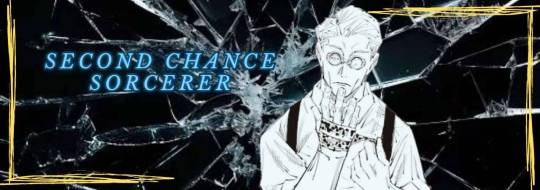
Pairing: Nanami Kento x Fem! reader
A/N: Chapter 3 is here! I'm glad I was able to write this out. As usual, this has been adapted to y/n format. To read the OC version, check out AO3.
Oh, and I highly recommend listening to Yet by Switchfoot while reading this chapter. It just pairs well.
Warnings: childhood trauma, lots of angst
Chapter 1 | Chapter 2 | Chapter 3 | Nanami masterlist

“By facing your deepest regrets.”
Nanami feels a chill rake over his spine as the shadow being says the words.
“Regrets? There isn’t a single sorcerer in the world that doesn’t have regrets. There’s no good way to rank them.”
“Really 7:3 sorcerer? You don’t believe some regrets hurt more than others?” The Spectator watches with keen eyes as Nanami contemplates its words. There’s a pregnant pause while he considers, glancing around at Phantom Tokyo as he does so. He didn’t like how the shadow easily figured out what he’d been hiding for years.
A sorcerer’s life was always full of regrets; regret for not being normal, regret over their fallen comrades, regret over not taking time to themselves, regret for not being able to fall in love freely.
“What good is spending time thinking about regrets anyway?” he asks finally. “There’s nothing we can do about them. We learn to accept them and move on.”
“Have you? Accepted, that is?” the shadow asks back. Nanami stares at it, feeling a jolt pass through him.
“Of course I have. Now unless time travel is something the purgatory realm offers, I don’t see the point. I can’t go back and undo the things I regret. So of course I learned to accept them.”
“Then why do you never allow yourself to think about them? If you’ve really accepted them, then thinking about them shouldn’t bring that feeling of guilt in your chest, should it?” There’s a sly tone to the shadow’s question as it asks.
Taken aback, Nanami glares at it but doesn’t answer. Anyone who had lived his life wouldn’t question the guilt that accompanied his regrets. It was an endless cycle, reminding himself that most of the things that had happened weren't things he could have necessarily controlled yet it weighed down heavily on him. And how could they not? He was there when those awful things happened. It was a natural human tendency to wonder if the outcome may have been changed if he had done something differently.
The shadow does not fail to notice the less-than-kind expression on his face. “The only reason I ask, sorcerer, is because many try and fail to escape the purgatory realm even after agreeing to face their deepest regrets. Most believe it is coming to terms with them when in fact, it’s more than that.”
It glides slightly closer to him before continuing. “It’s not enough that you come to terms with your regrets. But it’s learning to recognize that despite everything, despite all the guilt and unhappiness, life is still worth living. Many do not make it to that stage, and if that concept fails to take root, then the realm decides your life isn’t worth saving, and it will do what it was created to do, and end your life for you. You must want to live so much that all the regrets that feel like failures become reasons to live.”
“That’s unrealistic. Shouldn’t you have to find new things to live for instead? Who would want to continue living because of their regrets?”
“And what’s the guarantee those new things won’t become regrets later? Life doesn’t necessarily go linearly, does it? Something that brought you joy one day can make you miserable the next. It’s the same with people and relationships, isn’t it? You could have the best relationship with someone, and one day, they may hurt you, or you hurt them, and that too becomes a regret. Depending on the situation, it may be superficial or deep. If that person means enough to you, you won’t end the relationship because of that single regret, do you? Sometimes people experience multiple regrets with the people in their lives. It’s the same with wanting to live. You can keep finding new reasons to live, but ultimately, it’s realizing that life is worth living even with regrets.”
Nanami ponders the words, the frown on his face deepening. So many people in his life had come and gone. Some had been his choice, others due to circumstances beyond his control. He thinks about everyone he currently knows, and the shadow chuckles at his state. “I promise I’m not speaking in riddles meant to be solved. This journey is different for everyone. For some, it’s simple. Others need a few reminders about how much opportunity life offers.”
Nanami paces up and down the aisles of the bookstore, contemplating. “And what does facing one’s regrets look like?”
“It’s different for each person that enters the Trials. Some say it’s a withered garden, and they need to tend to the most neglected flowers and once the garden is in bloom, they can go back to living. Others are the only doctor in a hospital full of sick patients and don’t get respite until everyone is nursed back to health. But I will say that not everyone makes it through. Some become consumed by what they see or begin to feel hopeless with the amount of work necessary to survive. You have an additional restriction of being at the mercy of however long the neutralized energy remains in that charm of yours. So I’d say to not waste it much longer.”
Nanami glances at the aum charm on his wrist and feels a tinge of hope bubble inside him. He tries to think optimistically. Finding reasons to live even with the regrets…he hadn’t considered it that way.
“You also have an unexpected plus. You have someone who desperately hopes you might come back to them. Most don’t necessarily have that privilege. The additional incentive will hopefully allow you to navigate this quicker.” The shadow adds trying to gauge his reaction.
Nanami again looks doubtfully at the charm. Deep in his heart, wedged away was a little box he hadn’t dared to open or peek at since he locked it away at 16. Even the sheer idea of it felt taboo, and he hadn’t allowed himself to dwell on it. But he allowed himself a moment of guilty pleasure, wondering if y/n had received his message by now. What would be your reaction? Shock? Happiness? Would you be crying tears of joy?
He tries to imagine your face, putting together fragments of the various expressions he had seen during your time together. The lines of dissatisfaction that tugged at the corners of your mouth when he kept saying logistically sorcerers didn’t live very long, the glitter in your eyes when Itadori-Kun brought back a pastry for you, or the melancholic way the tip of your nose turned red when you watched those sad movies when he was teaching you how to channel your energy into the cursed doll. The day you had chosen Sophie’s Choice was a hard day overall, with him coming back from a mission only to see you, Ino-Kun, and Itadori-kun squished together on the sofa, the doll on your lap, all of you with tears in your eyes.
Would you have cried like that for him after learning about his supposed death? Or maybe it was more intense than that? The kind of ugly crying where one trembles and can’t catch their breath? Or maybe there hadn’t been any crying at all. He shakes his head. He had no evidence that he had meant anything to you at all. The aum charms had been put on Ino-Kun and Itadori-Kun as well. Yet part of him hoped you had felt some kind of grief, that he had meant something to you, even if it was just as your teacher.
In any case, whether or not you had cried was irrelevant. As the shadow had pointed out, it was thanks to your charm that he was now alive, and that wasn’t a thing to be taken lightly.
“You called it the Trials?” he asks The Mediator, who nods.
“I will have to send you into another space where you can deal with your regrets. It’s rumored to be inside one’s heart but so far, no one has been able to confirm that. Now remember sorcerer. Once inside, you must look at your regrets, each one, learn the lesson it provides, and accept that you can live, despite having it. This isn’t about coming to terms with your regrets. It’s about understanding that your life isn’t any lesser to live just because you have them.”
Still not entirely convinced he knew what the shadow meant, he nods shakily.
“Take your time, but don’t dawdle. You don’t have forever. And when in doubt, remember the reason you’re alive right now.”
“Have people have been successful before?”
“Indeed. And went on to live very happy lives, in fact even fuller lives than they had before.”
Nanami feels his pulse quicken. He had more questions but it felt pointless to ask them. As the shadow had pointed out, he was wasting precious neutralized cursed energy. He can feel his earlier dream of dying, of fading away into oblivion, slipping away like water through his fingers.
“Ready?” The shadow’s silvery eyes gleam at him, waiting.
With resolve, Nanami nods. It felt daunting, but he knows now he has to try. That there might be things he still needed to experience in the world of the living.
The Mediator gives him a nod of finality before raising a shadowy limb from its side, looking eerily like the Grim Reaper for a moment, black smoky fingers curling up into its palm. Nanami turned to look behind him, transfixed, as what appeared to be a rectangle of light began to materialize. It had a strange metallic look, and as it grew larger, he could have sworn he heard the faint pulsation of a heart fill the space in the bookstore. Perhaps he really was going into a dimension of his own heart. The thought filled him with wonder, something he hadn’t felt since the loss of innocence during his teen years.
He knew from a medical standpoint that his heart would be the same as any other human being, but he couldn’t help but try to imagine what it looked like in this dimension. Was it warm? Cold? Would he get a garden or a hospital? Or something more wondrous and complex than either of those? The rectangle finally stops growing and hovers a few inches off the ground and Nanami chances a peek inside. It looked curiously smooth and paved from his position, and appeared to have light reflecting inside it, and again, he heard the undeniable sound of a heart beating, like it was trying to urge him to look inside himself.
“This is where we part, sorcerer. I hope we do not meet again.” The shadow bows to him and Nanami returns the gesture, pushing his glasses back onto the bridge of his nose as he straightened.
“Thank you for the guidance. I feel a little less willing to die at this moment.”
“That is reassuring to hear. Your initial attitude had me worried. Now go, there isn’t any time to waste.”
Nanami looks at the bright geometric patch before squaring his shoulders and purposefully stepping forward towards the metallic, reflective light. Y/n’s face burns in his mind as the sound of a heartbeat fills his ears and he walks through the door into what lay beyond.
Once inside, he chances a glance backward and sees the portal sealing off, the briefest glimpse of the shadow creature catching the corner of his eye before it closes into a smooth surface of reflective glass. The dimension is plunged into silence, deafening and slightly unsettling. The blond sorcerer moves forward, taking in his new surroundings, astonished by what he saw.
His Trial was a smooth, long, corridor that appeared to be made of endless panels of mirrors from top to bottom. His shoes clicked on the polished glass as he moved forward. What was he supposed to do? Unlike the Trials that had been described to him, there was nothing here that needed his care or nurturing. He appeared to be alone, with nothing but his reflection for company. He ventures a few steps forward, thinking.
“The scenarios described to me said I needed to take care of whatever I found here,” he mused out loud, continuing to walk, randomly looking up, down, and to the sides where his glass image followed suit. “But I don’t see anything here. Wait, don’t tell me…” he almost laughs aloud, Y/n’s chief complaint echoing in his head. “Is the person I have to take care of myself?” he asks the mirror dimension.
Immediately, the panel of mirrors on his left changed. While the ceiling, floor, and right wall retained his reflection, the left began to show swirls of color and distorted shapes. Fascinated, Nanami steps closer to the one nearest to him and peers into the glass. The abstract splotches instantly form a crisp image, playing like a scene from a movie and Nanami is astonished at what it shows him. A young boy with a tuft of messy blond hair ran towards a lake in happy abandon, water wings around his thin arms as he splashed in. Nanami’s gut twists as he remembers this day. The day so long ago, when he had learned that things such as curses really did exist, that they were not imaginary misfortunes cast by witches onto unsuspecting people like his storybooks had said.
He watched his younger self floating at the surface of the water, his family a short distance away as they set up lunch on a picnic table. One of his cousins joins him shortly, giving chase as he lets out a peal of laughter and tries to kick away from him. Knowing what was going to happen, Nanami watched his younger self helplessly as he swam towards the middle of the lake, a brave 6-year-old unaware of the darker things that lurked in places that held negative emotions.
Unbeknownst to his family at the time, a girl had drowned there that past summer, something that Nanami had unearthed years later after this incident had occurred. His younger self now reached the middle of the lake and was suddenly lost, dragged under by an invisible force. The little boy blinks in shock, then opens his mouth and lets out a muffled scream as he sees the ugly curse that had caught hold of his foot. It grins, showing off too many teeth as he struggles, its pale green skin glimmering grotesquely under the watery light before he manages to kick the curse with his foot, swimming to the surface, coughing and spluttering, desperately trying to make his way back to land. His cousin looks at him in confusion as he swims in the opposite direction.
“Get out of the water! Get out!” The shrill screams echoed off the lake as he finally made it to the edge and hauled himself out, laying on the grass shivering. He watches in panic as his cousin stays where he is, treading water and not making any attempts to come back. His father sprints over to check on the situation looking alarmed.
“Kento, what’s going on?”
“There’s something in the water! Tell aniki to get out!” Younger Nanami practically yells, trying to put distance between himself and the lake. His cousin shrugs, then takes a breath and goes underwater. When he resurfaces, he shakes his head.
“There’s nothing in here! Kento did you see a huge catfish or something and freak out?” he taunts, a smirk appearing on his face. The blond boy shakes his head no vigorously.
“There’s something there! I swear!”
“You’re just making things up! If you’re too scared, then stay there, I wanna swim.”
Nanami watches his younger self shrink, drawing his knees up to his chest in terror, watching his cousin swim fearlessly in the water. However, nothing happens. Several minutes pass by before his cousin finally comes back out, hair dripping. “Fraidy cat,” he shoots at him before joining the others at the picnic table. Younger Nanami walks to the table too, determined to get his point across.
“There really was something there!”
His mother reaches out to pat his head. “It may have been a large fish Kento. It’s ok to admit it startled you,” she says emphatically, and the younger boy’s expression drops. Adult Nanami felt it inside his chest, that feeling of knowing they didn’t believe him, and that it was the beginning of almost a decade of them convinced he was a liar, saying things for attention. Younger Nanami becomes quiet after that, sitting in defeat at the table, the fresh barbeque and corn on the cob tasteless in his mouth.
What was he supposed to learn from this? Adult Nanami pulls away from the mirror, feeling his heart tighten, feeling sad for the little boy sitting so dejectedly at the table. He takes a deep breath, knowing this was the moment he started to not trust his family, his parents, with any of the things he saw. The curses only worsened from there, almost like because he had seen one, all of them suddenly felt comfortable revealing themselves to him. His chest felt heavy with the grief filling him. The shadow had said to take the lesson from the memory and move on.
He leans against the opposite panel of mirrors, trying to get his feelings into check. Regrets from that day…he regretted scaring his family. He regretted being able to see that curse in the water. He regretted finding out he was different from everyone else that day. And how were these regrets supposed to become reasons to live? He racks his brain. He tried to warn his cousin about the unseen danger. That shaped him into becoming the responsible one in any situation. He had to be aware of what the others couldn’t see. It made him protective. It made him want his students to have a better childhood than he did. Was that it? Him turning into a guardian for everyone around him was a reason to live?
And just like that as the thought came into his head, the mirror began to frost at the edges, becoming more and more opaque as it covered the length of the panel before the memory became fully obscured, no longer visible to his eyes.
Nanami swallows, still slightly unsettled by what he saw. It had been one thing to experience that as a child, but watching it as an adult, seeing how the people who were supposed to be looking after him brushed away his fears like they were nothing, hurt, even now. Part of him wanted to hug his younger self, to tell him he had become someone that everyone depended on, that someone wished for him to stay alive so hard that she put a neutralizing charm on him and saved his life.
Was this how the rest of his Trial would be? If the first memory it showed him was this one, Nanami knew it would only get worse from here. His being felt painfully raw after seeing that childhood recollection, and he was unsure if he wanted to see more of that. The events that occurred at Jujutsu High when he was a teenager were unavoidable; he had been prepared for those to crop up based on the conversation he’d had with the shadow, but to see himself defenseless, as a child, with no one on his side was already breaking down his psyche.
As he gathered his will to push on, he recalled the shadow saying this Trial was so he could face his deepest regrets. Deepest, not every. Could he have possibly found a way to get out of here faster? Nanami knew he had regrets that ran deeper than the day at the lake. If he approached each mirror, he would know which regret it was showing him. What if he could skip over the ones that weren’t as bad and only get to the ones that had really impacted him?
Motivated by the idea, he peeks into the next mirror panel, the colors and shapes coming into focus and he sees himself at 11, seated on the sofa with his parents, his dad looking stern, his mother exasperated. Recalling this event, Nanami quickly walks away from the mirror to the next one. Dealing with his regrets should not involve also dealing with his emotional trauma. That was too much.
He stands in front of the next mirror and waits for the memory to come into focus. However, to his dismay, the colors remain as jumbled objects colliding with each other, refusing to coalesce. Hoping this was just a coincidence, he moves to the next one and is met with the same view, abstract movements, and blurs of action, refusing to show themselves to him.
A regret is a regret, no matter how big, perhaps. Or maybe, the mirror dimension had determined what his deepest regrets already were, and he would have to face whatever it threw at him.
With a sigh of defeat, Nanami turns back and goes to the mirror he was hoping to avoid. His heart was racing at the thought of reliving that day, but he was left with no choice. Once directly opposite to it, he braces himself for the memory.
“Kento, this cannot go on any further. Your mother and I…we’re at a loss about what to do.”
“I’m sorry otosan.” His 11-year-old self keeps his gaze trained downwards, observing his legs that were swinging off the edge of the sofa. “But I mean it, it was there, trying to hurt my classmate.”
“Kento.” His mother leans towards him. “I am not sure what to believe anymore. These…incidents. These…stories. They’re becoming a more frequent occurrence. The doctors are baffled.”
Nanami’s dad, a man resembling him now in terms of height and build, tsks and shakes his head. “They’ve suggested medications, talking to a therapist-”
“The therapist wasn’t helping. They never believed anything I said.” The small boy appears to shrink a few inches in between his parents, his little fingers now fidgeting with each other as he speaks his words.
“Kento, the problem is, we’re having difficulty believing you as well.” His mother looks like she’s about to cry and it fills his younger self with guilt, that he’s making her this way over him. “The doctors believe you have schizophrenia. It would explain you seeing things that aren’t there-”
“But they are there,” little Nanami insists desperately, looking at his parents with tears in his eyes. “They’re there, but it feels like I’m the only person that can see them.” He sees the look his parents exchange and feels like his worst fear is being confirmed; that his parents thought he was going crazy.
Adult Nanami steps away from the mirror, feeling sweat on his forehead. He feels his heart hammering in his chest and he slides down the smooth glass onto the floor trying to not fall apart. It was behind him. He had put this all behind him. He had vowed to never remember any of this ever again. It was why his will stated all his possessions should be donated to charity. He didn’t have a family. Had no one checking in on him. No one to visit during the holidays, save the other staff from the school.
Jujutsu High had been both a blessing and a curse. But Nanami hadn’t felt like he was part of a family in decades. Hadn’t allowed himself to want that simple wish because it hurt too much. The aum charm swings against his leg, a pendulum reminding him of the limited time he has left. He realizes the day spent at the amusement park had been the first time in his adult life that he had allowed himself to indulge in that little fantasy. That the little group he had trained had somehow become his family of misfits. It wasn’t until now that he realized how much he wanted that to become a reality. That he wanted to belong.
Taking deep calming breaths, he gets to his feet, not totally prepared to face the memory again but is astonished to see the mirror has already frosted up, the memory blocked and gone. Admitting he wanted a family…another lesson learned.
Unsteadily, Nanami moves on, hoping the next memory isn’t as brutal as the first two.

support banner by @/ cafekitsune
tagging:
@that-goth-bisexual @buttercupbitches @jadedjane @hunnie-lily
@starsinmylatte @soft--cherry @estarlias
@daswanj @connorsui @kentosgirlie @dreaming-about-seireitei @byul9158
@darkstarlight82 @whatshernameis @Galatict3a
@Mangiswig @bleachbrainrotbro @illusionaryennui @harlekin6
@pernesophe @26xidk @an-ever-angry-bi
@sweetbouquetpanda @muzansfangs
#nanami kento#nanami kento x reader#nanami kento x y/n#nanami kento x you#nanami kento fluff#nanami kento smut#nanami smut#jjk nanami#nanami x reader#kento nanami x reader#kento nanami x you#nanami x you#nanami x reader smut#nanami fluff#nanamin#jujutsu nanami#jujutusu kaisen#jjk#vee writes#second chance sorcerer
161 notes
·
View notes
Text
wei wuxian vs. pragmatism: what MDZS intends to say about righteousness
copy/pasting most of my rather bitchy reply into its own individual post because i think it deserves to stand on its own.
so i think we can all agree that MXTX intends for us to read MDZS and conclude that wei wuxian is ultimately a deeply heroic and righteous person. whether you as the reader agree with this assessment of wei wuxian's moral character is another question entirely, but at the very least it is fairly obvious to all of us that MXTX intends for us to read him as a good person.
so why does MXTX call wei wuxian a good person? what aspects of his character and which of his choices make him a good person? what moral framework and what definition of morality does MXTX employ in order to call wei wuxian a good person?
i posit that MXTX argues that wei wuxian is heroic precisely because he is not pragmatic - because he adheres to his moral ideals despite the consequences, and because he did not make moral sacrifices at critical junctures of his life. the first half of this post will argue that wei wuxian is not pragmatic. the second half of this post will argue that this is exactly why wei wuxian is heroic, and that the moral framework employed by MXTX is deeply idealistic instead.
so let's begin.
let's start by establishing two things.
first: what MXTX argues about morality through the narrative of MDZS and the reader's own beliefs about morality are two different things. me saying "MDZS argues that xyz is righteousness" and me saying "i think xyz is righteousness" are two different statements. the following analysis is concerned not with what i myself consider to be righteous, but rather what MXTX argues through MDZS is righteous.
second: wei wuxian is not pragmatic.
what does it mean to be pragmatic? unless we are speaking about the school of philosophy specifically (which i am not here), being pragmatic means being grounded in reality and focused on practical outcomes. it means being result-oriented and considering the consequences of your actions before you act; it means acting only after you have considered the potential consequences of all possible courses of action and have then decided which outcomes are acceptable. being pragmatic also means recognizing when achieving everything you want is impossible. and, in such situations, being pragmatic thus entails compromising to achieve a desired outcome, even if that means you don’t get everything they want. to put it in edgier terms, being pragmatic means being able to make moral sacrifices.
an idealistic person attempts the impossible. a pragmatic person recognizes when something truly is impossible.
wei wuxian is not pragmatic.
first, wei wuxian is not someone who carefully considers the consequences of his actions before he acts. in fact, he displays a startling lack of consideration for consequences. it repeatedly falls upon other characters to either try (and fail) to hold him back.
when wei wuxian punched jin zixuan for insulting first jiang yanli and then jiang cheng, did he consider that jiang fengmian and jin guangshan might then dissolve the betrothal, and that jiang yanli might have wanted to make a decision regarding that on her own? no. he just punched jin zixuan because he was mad that jin zixuan had insulted two people he loved.
when wen chao threatened mianmian, and lan wangji and jin zixuan stood up for mianmian, and then wei wuxian stood up for them by holding wen chao hostage in turn - did he consider that there might be consequences for humiliating and threatening the life of the son of a warmongering great sect leader who has already proven capable of attacking other sects? no. did he stop and think "alright, wen ruohan has already attacked the cloud recesses, which proves that he's willing to wage war against the other sects. threatening the son of a sect leader is an easy way to earn any sect leader's ire, and since i'm the first disciple of the jiang sect, this puts not just me but the entire jiang sect on wen ruohan's shitlist"? no. it would be one thing if wei wuxian weighed this possibility and then decided that rescuing an innocent girl and the people who defended her was more important was worth the risk - that would show that he considered the consequences and then made his choice. but the thought simply never entered his mind. he acted simply because he wanted to save mianmian, jin zixuan, and lan wangji from the wens; he did not think beyond that.
when wei wuxian busted the wen remnants out of the qiongqi pass labor camp, did he have a clear plan as to how he was going to weather the political fallout? did he have a plan more detailed than "live quietly in the burial mounds until everyone forgets about us"? no. when jiang cheng challenged him as to how he was going to survive the situation, he did not in fact offer anything more concrete than "we'll just wait for everyone else to forget about us." he blustered about being a once-in-a-generation genius who could accomplish the impossible, but he provided no actual plan as to how he was going to do it. this leads me to conclude that wei wuxian did not in fact have a long-term plan for handling the consequences when he went ham at the qiongqi pass camp - that, instead of weighing the consequences and then making his decision, he instead decided immediately that this was something he had to do, consequences be damned.
and then - on top of this - all of his following actions then point in the exact opposite direction of his stated plan of waiting for everyone to forget about them. because instead of doing anything to fade into the background, everything wei wuxian did instead just convinced the jianghu he was an intolerable threat.
and this was not a sustainable strategy.
one thing i really appreciate about MXTX is that she does not make the rest of the jianghu into one-dimensional villainous morons. it's quite easy for lazy writers who want a persecution plotline to have the rest of the story's society magically start hating on the protagonist for no good reason, to make every background character in the story's world a three-braincell moron. but MXTX is not that author. it speaks to MXTX's skill as an author that, from the perspective of the rest of the jianghu, fearing wei wuxian as a mortal threat was an entirely reasonable conclusion for them to come to.
first, the gentry's most recent direct interaction with wei wuxian during this time period is him threatening to kill all of them. when jin zixun doesn't give him the information he wants, wei wuxian straight up says: "if i want to kill everyone here, who can stop me? who dares stop me?" this is a threat! and - surprise - threatening to kill people naturally makes people think that you want to kill them!
next, wei wuxian refined wen ning's dead body into the first sentient fierce corpse in history, and also the strongest fierce corpse in living memory - and then took wen ning with him on night-hunts. that's where the reputation of "the yiling patriarch and his ghost general" comes from. this very naturally made the rest of society fear him even more, because now the guy who has just recently threatened to kill you has demonstrated even more of the power to easily do so! the unparalleled power to do so, which no one else possesses and it would be very hard for anyone else to counter! add in the fact that wei wuxian's activities were also attracting prospective disciples - people gathering outside the burial mounds because they wanted to learn demonic cultivation - and naturally the public is even more frightened, because now it looks like the guy who threatened to kill all of you is also gathering the political force to do so!
the public is incorrect about wei wuxian's intentions, of course. but what does wei wuxian do to correct these misconceptions? to rehabilitate his public image, because now his public image has the life of not just himself but also all the wen remnants under his protection riding on it? to prove to the public that he isn't an active threat to their lives - that he does not seek to murder them all in their beds - that it is safe for them to allow him to live, and that they can in fact survive if they don't kill him?
nothing.
it would be one thing if the story mentioned how wei wuxian tried to correct the malicious rumors about himself and failed. but that is not what happened. what happened is that wei wuxian sat on his corpse mountain and let everyone else say what they wanted to say. and when he left his corpse mountain, it was to bring his one-of-a-kind unparalleled sentient fierce corpse with him on night-hunts, which of course just fanned the flames of the rumors instead. he doesn't even tell the prospective pupils camped on his front door to fuck off - he just sneaks in through the back door.
this is not pragmatic behavior. though you can argue that wei wuxian's strategy here was to become so powerful and so scary that no one would dare try to fight him, anyone with a brain can tell you that this is not a sustainable solution in the long-term. first, if you want to use threats to keep someone from attacking you, you also need to promise stability - you need to give people the reassurance that if they don't start shit with you, then you'll leave them alone too. if you drive the "threat" factor too high, as wei wuxian did, you instead end up convincing people that if they do nothing you'll kill them anyways - that they have no choice but to kill you if they want to survive.
second, if you want to use threats to keep someone from attacking you, you also need to prepare for the inevitability that, if someone does end up getting hurt, everyone will blame you first and no one will want to hear your side of the story. after all, if someone gets hurt, then the first suspect everyone looks towards will be the guy who's been consistently saying "i'm strong enough to hurt you! i'm strong enough to hurt you! don't start shit with me because i'm strong enough to end you!" for the past few months. this is basic common sense. and yes, the society of MDZS is unfair - wei wuxian deserved a proper trial and investigation after the death of jin zixuan. but the fact that society is unfair is something a pragmatic person would have recognized and planned for.
wei wuxian did not recognize and plan for this reality. even after he accidentally kills jin zixuan, wei wuxian still insists that if only the jianghu investigates jin zixun's hundred holes curse, they'll see that wei wuxian didn't cast the hundred holes curse, they'll see that there was more scheming going on, etc etc. wen qing has to directly spell out for him that, at this point, society no longer cares about the truth of the matter. it seems that wei wuxian was actually oddly idealistic about the true nature of his society all the way until the very end.
all of this leads me to conclude that, when wei wuxian busted the wen remnants out of the qiongqi pass labor camp, he did so without considering the consequences of his actions. he assumed that he could improvise and weasel his way out of this situation, as he's always done in the past with his typical genius - only this time, he was wrong.
wei wuxian acts without considering the consequences of his actions. he does not make a decision only after carefully deliberating over all of the potential outcomes - not at all. instead, he acts in the moment - not out of any rational consideration of potential outcomes, but rather because it is simply something he must do. this by definition makes him a deeply unpragmatic person.
to put it into more familiar terms, for wei wuxian, the righteousness of an action comes not from its consequences, but are rather inherent to the action itself. even if he were doomed to fail, he could not give up on the wen remnants.
second, at critical junctures, wei wuxian is unable to make moral sacrifices. to be pragmatic is to know when you have to sacrifice: to know when, in order to achieve the most inalienable of your goals, you have to give up on some of your other goals. this is something wei wuxian is consistently unable to do.
of course, when it comes to his own wellbeing, wei wuxian is all too willing to sacrifice. he'll carve out any number of his internal organs to save those he loves. but this honestly speaks less to wei wuxian's moral framework and more to his lack of self-worth from a troubled upbringing.
because, when it comes to any moral cause, wei wuxian is entirely unable to sacrifice anything, even if being unable to sacrifice entails more negative consequences. wei wuxian could not sacrifice mianmian, jin zixuan, and lan wangji to wen chao and his goons, so he took action and took wen chao hostage himself. to sit back and do nothing as wen chao threatened the lives of those three was simply unthinkable for him - even if it meant taking a course of action that put yunmeng jiang in danger.
wei wuxian's relationship with jiang cheng deteriorated because jiang cheng did not know about the golden core transfer: because jiang cheng did not know that wei wuxian could no longer cultivate, from jiang cheng's point of view, it looked like wei wuxian was just refusing to help out and fulfill his promises for kicks. wei wuxian could have made things a lot easier for himself and also any wen remnants he chose to rescue had he simply told jiang cheng the truth - but he knew that finding out the truth of the golden core transfer would make jiang cheng miserable, and [jiang cheng's happiness] was not something he was willing to sacrifice.
wei wuxian's single most prominent moral decision is his refusal to allow the wen remnants to be sacrificed. anyone with a shred of political sense had to know that rescuing the wen remnants and then protecting them would be near impossible - that it entails making an enemy of the jin, and due to the jins' power, the entire jianghu. wei wuxian himself knew this; he is no moron. wei wuxian also had no long-term plan, no allies, and significantly less power than the rest of the world believed. yet, despite this all, he acted anyways, because he could not let the wen remnants be sacrificed.
the wen remnants wei wuxian rescued from the qiongqi pass labor camp included both regular civilians and cultivators. perhaps wei wuxian could have negotiated a proper release for the non-cultivating civilians, such as granny wen and a-yuan, had he chosen to give up on the cultivators. but - the question of whether this would have worked or not aside - this was not a sacrifice wei wuxian would be willing to make.
nor could wei wuxian sacrifice the safety of yunmeng jiang. i am firmly of the belief that, had yunmeng jiang formally stood by wei wuxian's side after wei wuxian attacked the jin-run labor camp, lanling jin would have eventually declared war on yunmeng jiang, and yunmeng jiang's would inevitably be destroyed. both wei wuxian and jiang cheng understood this as well - which is why wei wuxian told jiang cheng to let him go.
(you can argue - successfully - that wei wuxian did in fact sacrifice [his obligations to yunmeng jiang and his promise to jiang cheng] by leaving yunmeng jiang to protect the wen remnants. this is true. but i think that - from wei wuxian's point of view - this was not much of a sacrifice, because due to wei wuxian lacking a golden core, he already viewed himself as mostly useless to yunmeng jiang. so him leaving - in his view - is not really that much of a loss for yunmeng jiang.)
wei wuxian promised wen qing that he would return wen ning's consciousness to his corpse. when wei wuxian made this promise, he had no idea if he could actually pull it off or not. but then he did - and, in the process, created the most dangerous weapon the jianghu had seen in living memory. wen ning specifically, or moreso wei wuxian's inability to control him, leads to so much of wei wuxian's eventual downfall: wei wuxian loses control of wen ning and accidentally kills jin zixuan; when wen ning goes to turn himself in at jinlintai, he ends up going berserk again and killing another 10-20 jin and lan cultivators, which leads to the nightless city pledge conference. frankly, wei wuxian could have avoided a lot of trouble - or at the very least, a lot of the public's fear - had he not raised wen ning from the dead. it's not like he'd be completely defenseless without wen ning, either. but wei wuxian promised wen qing he would resurrect wen ning - and he could not sacrifice his promise to wen qing because of what wen qing had already done for him.
a pragmatic person is able to make sacrifices, including moral ones. at the very least, a pragmatic person recognizes when sacrifice is inevitable, when all paths lead to something being lost. a pragmatic person, put in the trolley problem, would recognize that there were only two options and that both options involve sacrifice: either he must kill one person, or he must allow five people to die. there is no path forwards in which all six people live.
wei wuxian is unable to make moral sacrifices. he clings on to all of these moral causes, all of these promises and obligations, and it is precisely because he attempts to hold onto all of them that he ends up losing everything. to reuse the previous example, wei wuxian in the trolley problem tried to save all six people because he could not accept any of the sacrifices made inevitable by the trolley problem.
to put this all together - wei wuxian is not a pragmatic person. he makes decisions with his gut, not his head - he does not consider the consequences of his actions before he acts. nor is wei wuxian able to make sacrifices - even necessary ones in order to avoid greater tragedies.
but. none of this means that wei wuxian is not a deeply heroic person. rather, to do what you believe to be righteous and attempt to live up to your ideals despite the consequences is exactly what MXTX lauds as moral. and to be unable to make a moral sacrifice when everyone else in your society easily does so is in fact deeply heroic.
it is precisely because wei wuxian is not pragmatic that MXTX declares him a hero.
some people, including myself, favor a moral framework that centers pragmatism and reason as virtues. to us, the ideal moral character is someone who makes decisions based on reason and not emotion, who considers the potential consequences of every course of action before making a decision, and who then, based on these inferred future consequences, uses reason to deduce which of all of the possible outcomes is the most preferable.
but this does not in fact describe wei wuxian, nor is this how wei wuxian views ethics. and to be honest, i don't think this is how MXTX views ethics either.
in all three of her stories, MXTX repeatedly comes down harder on the characters who make pragmatic decisions, the characters who are willing to sacrifice. in fact, killing sunshot soldiers while acting as wen ruohan's spy, and then killing nie mingjue's men in order to ensure a chance at killing wen ruohan and saving nie mingjue, was the pragmatic thing for meng yao to do, because that was the least bloody path forwards towards a sunshot victory over qishan wen. in fact, cutting ties with wei wuxian after he attacked the jin-run qiongqi pass labor camp was the pragmatic thing for jiang cheng to do, because it was the only path forward that did not put yunmeng jiang, his first and foremost responsibility, in the line of fire. and yet (though the situation is less clear with jin guangyao), MDZS as a narrative criticizes both jin guangyao and jiang cheng for these decisions - because, to MDZS, righteousness does not lie in pragmatism.
(this is a statement i personally disagree with. but we are here to discuss what MDZS wants to say about pragmatism and righteousness, not what i want to say about pragmatism and righteousness.)
by contrast, the one single act for which deeply controversial jiang cheng is ultimately lauded for in the narrative is also his single least pragmatic, most emotional act. the one single act of jiang cheng's that MDZS does not criticize is when, after the fall of lotus pier, jiang cheng ran out from his hiding spot to distract the wen soldiers from seeing wei wuxian. from a filial, duty-based point of view, this was a deeply stupid and unpragmatic course of action: jiang cheng's first and foremost duty, as the sole surviving jiang and new sect leader jiang, was to survive, rebuild his sect, and avenge his parents. from a consequentialist point of view, this impulsive choice is also what led to the domino-fall of tragedy that followed, since jiang cheng then got captured and had his golden core melted, which then led to everything else. yet this stupid, unpragmatic, and impulsive decision is ultimately the one act MDZS considers to be jiang cheng's single most heroic.
the key as to what MDZS considers to be heroic, what it considers to be righteous, lies in the jiang family motto: 明知不可而为之, attempt the impossible. this line, taken from the analects of confucius, can be considered to be a deeply deontological ideal. i find this twitter thread (warning to my followers: does kind of dunk on JC) to be rather helpful in elucidating this line's meaning.
to attempt the impossible, to try what shouldn't be tried. "ask yourself not whether you can do it, but whether you should...consider not the result but rather the journey - have a clear conscience regardless of outcome." in other words, what matters is less whether you succeeded or failed, or what sort of outcome your actions brought about - what matters is that you tried. what matters is that, in the face of overwhelming odds, you tried to do what you think is right. and even if you end up failing - even if everyone you sought to protect ended up dying - the fact that you tried still has moral weight.
this is why it was righteous of wei wuxian to save the wen remnants - even though the ultimate consequences of that decision were overall negative, even though everyone wei wuxian tried to protect died. in fact, if wei wuxian had died immediately - if he had been shot down by jin archers at the qiongqi pass labor camp the moment he came within their range - if he had died before any wen in the labor camp realized someone wanted to save him - he would still be a righteous person. because, for MDZS, what makes an action righteous is not its consequences. for MDZS, what makes a person righteous is not what impact their actions have on the world, but rather that they have the sort of moral character that leads them to never give up on their ideals.
wei wuxian does not consider the consequences of his actions before he acts. or, should i say - wei wuxian makes decisions despite their consequences, because despite the consequences there are simply some moral causes he simply cannot give up on. wei wuxian did not save the wen remnants because it was pragmatic to do so. it was in fact deeply unpragmatic to do so. no - wei wuxian saved the wen remnants without a concrete long-term plan, without having thought through anything beforehand, with the knowledge of how weak he was in reality - because he could not give up on the wen remnants, consequences be damned.
to have some moral causes you simply cannot give up on, no matter the consequences - to MXTX, is deeply heroic. in this sense, MXTX's moral philosophy is not pragmatic at all, because to be pragmatic is to be concerned with practical consequences. instead, both wei wuxian and MXTX herself are deeply idealistic, because what matters to them are ideals and principles that extend beyond consequence.
as the linked twitter thread notes, this is why MXTX waits until the very end of the book to reveal that wen yuan, now lan sizhui, lived. this is why wangxian only meet mianmian and her family at the end of the book. this is why all of the cumulative positive impacts of wei wuxian's resurrection - jin ling forgiving wei wuxian, jin guangyao, and wen ning, for one - are kept to the end of the story: because MDZS needs to move away from the consequentialist argument. MDZS needs to establish that wei wuxian's righteousness is separate from the impact of his actions: that wei wuxian isn't righteous merely because his actions had a positive impact for which others can thank him, but rather because the actions he undertook were inherently righteous on their own. that even if none of these positive impacts existed - if wen yuan had also died, if mianmian hadn't made it - then wei wuxian's choices would still be moral.
this is also why MDZS ultimately comes down harder on characters like jiang cheng and jin guangyao, even though a more results-oriented moral framework would instead laud such characters. both jiang cheng and jin guangyao are deeply pragmatic characters: they put concrete results before abstract moral ideals, and they're willing to compromise on their ideals in order to achieve better results. i am a JC stan and a jiggy apologist because of these exact traits. but MDZS is a narrative that criticizes such pragmatism and instead holds up wei wuxian's idealism as a moral ideal - so, in order to advance its themes, the MDZS narrative ends up criticizing both jiang cheng and jin guangyao.
ultimately, this idealism - this criticism of pragmatism - lies at the heart of MDZS's themes. wei wuxian's righteousness is directly connected to the fact that he is not pragmatic. the fact that wei wuxian makes moral decisions despite the consequences, and that he is unable to sacrifice any moral cause - is all part of what makes him at once deeply unpragmatic and deeply heroic.
---
you see, the funny thing here is that i personally disagree with this theme. as i've said before, i'm a utilitarian. to me, the morality of an action does in fact arise from its consequences; to me, someone who compromises on their ideals to achieve better results is preferable to someone who adheres to all of their ideals and then loses everything. the character i consider to have had the greatest positive impact on this story's world is jin guangyao. the character i consider to have most dutifully fulfilled his obligations is jiang cheng.
therefore, i disagree with basically everything i wrote up there about "trying": i think that if you try to do the right thing, fail epically, and in the process of your failure get a bunch of other people killed as well, the fact that you failed this badly does in fact matter quite a bit. the bulk of my more haterish posts are born from this fundamental disagreement with what MDZS posits is righteousness.
however. as a reader i must recognize that [what i consider to be moral] and [what the author of this story considers to be moral] are two different things. my own moral philosophy may be heavily results-oriented, but MXTX's is much less so. therefore, regardless of what i think of wei wuxian, i conclude that MXTX ultimately intends for us to read wei wuxian as a heroic figure for the exact reasons i gave above - and that fact must then inform every analysis of MDZS i write.
#mdzs#wei wuxian#yanyan speaks#this analysis is also focused on wwx's first life bc wwx in his second life seems to give much fewer shits about moral causes tbh#second life for wei wuxian + all the good rewards at the end is basically a victory lap lol#anyways rip jiang cheng and jin guangyao for being pragmatists in a work that celebrates idealism#get dunked on ig#anyways wwx antis will read the above and go “well isn't this just a lot of words for 'the road to hell is paved with good intentions' ”#and like. yeah. that's correct#but mxtx is placing the majority of the moral weight on those good intentions imo#to mxtx - it is better to have heroic intentions and fail epically than it is to have unheroic intentions and achieve decent results.
180 notes
·
View notes
Text
By now, a majority of Autism researchers and clinicians are aware that the existing assessments for Autism are profoundly flawed.
They know the standard evaluation of Autism is sexist, with assessors excluding women for reasons like wearing makeup, having a boyfriend, being superficially polite, or not being fixated on suitably ‘masculine’ topics like ancient Roman history or barometric pressure.
They know Autism evaluations are racist, deeming Black Autistics “oppositionally defiant” or even “borderline” rather than acknowledging any social alienation or sensory pain they’re experiencing, and believing they must be overstating the difficulty they face in moving through the world.
And they certainly know that conventional Autism measures weren’t designed with adult Autistics in mind. Many of us are still asked to make up stories based on paintings of frogs in a toddler’s picture book, when we sit down for assessments at age 20, or 30, or 45 — because all the evaluation methods were written for young kids.
The data has already proven the far-reaching consequences of using such shoddy measures of Autism. People of color, gender minorities, older adults, and women are diagnosed at later ages, and also go undiagnosed at massive rates.
A growing population of scientists are admittedly interested in fostering a new literature of what they call “patient-driven” Autism research, but they never stop thinking of us as mere patients, the passive receivers of care rather than the leaders of communities and political movements who are the ought to be the primary authors of the studies about us, and the sole determinants of what our desired outcomes should be. Even when they observe that their work could benefit from a greater Autistic perspective, researchers do so from closed rooms, filled with other professionals who are largely not Autistic, wondering amongst themselves what it is that we want instead of learning to quiet their voices and follow our lead.
Though many basically well-intentioned Autism researchers believe that Autism assessments need reform, what neurodiversity really needs is to abandon the diagnostic process altogether. If Autism is a benign, neutral, naturally occurring form of human difference that requires acceptance rather than a cure, then there’s no need to diagnose it as if it were a sickness. And if hundreds of thousands of Autistic women, people of color, queer people, and older people have been able to give a voice to ourselves and find one another without having ever been given a label by a professional, then improved professional labeling is not what we need.
Autistic self-realization is the future of Autism assessment. We hold the collective wisdom, organizing ability, insight, and political power to define who we are. No authority figure should have to sign off on our identities.
Because psychiatrists fail to diagnose such a large percentage of the Autistic population, many Autism researchers now accept self-identified Autistic adults within their subject pool. Within the peer-reviewed journal Autism in Adulthood, self-realized Autistics often make up the bulk of the participant sample, and they have repeatedly been found to be indistinguishable from their formally diagnosed peers.
A growing body of research now also considers the presence of Autism-spectrum traits as qualifying for inclusion in many Autism studies. The data makes it quite obvious that Autistic people exist within all human groups, spread all throughout the world, and that a great many people have experiences in common with us who have not been formally diagnosed. This itself reveals that a formal diagnosis is hardly necessary, and that a psychiatric paradigm of accepting self-identification is inevitable. The researchers are increasingly already doing it.
You can read the full essay for free (or have it narrated to you!) at this link.
493 notes
·
View notes
Text
Gojo was once described by Gege as a “man of resignation”.
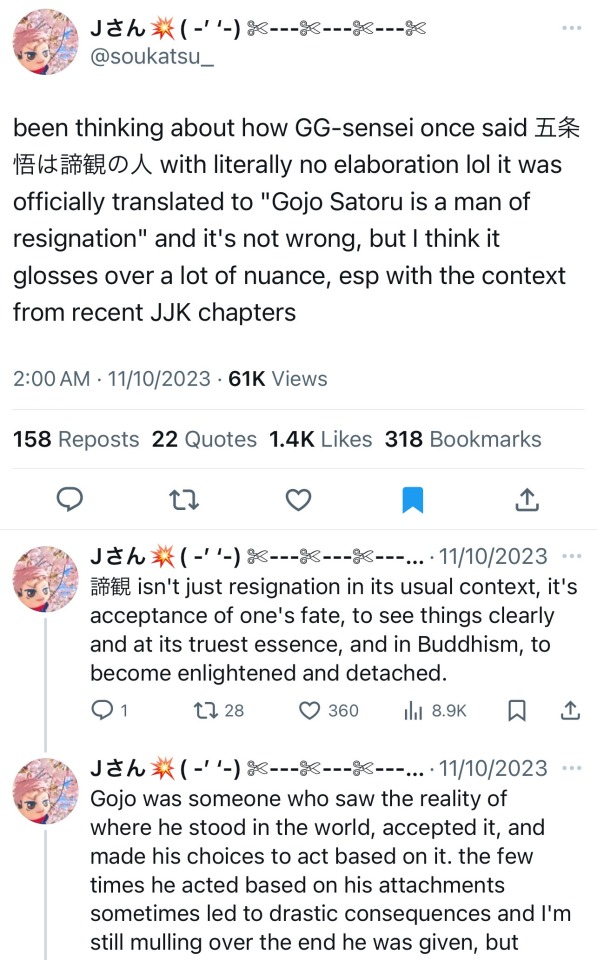
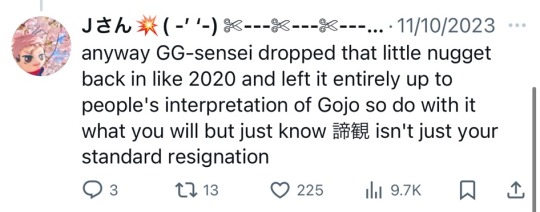
It is a facet of enlightenment - in which the concept of “non-attachment” is a big part of (attachment is viewed as the root of suffering).
We can interpret “resignation” in so many ways, as it explains so much about his immense capacity for love / acceptance, but also his tendency to... simply resign himself to an outcome / fate I guess - a form of passivity that can be either considered positive or negative, perhaps depending on outcome.
Going with the flow, neither chasing nor halting anything in particular with his immense might and potential. He swayed things to gently influence an outcome. Followed a designated path trying to rebuild the sorcerer world through being a teacher... which he couldn’t fully commit too either, because he had a role as a special grade who had to keep working.
That’s not to say he didn’t achieve anything - because of course he did. But nothing revolutionary. He said so himself to Geto: he didn’t see a point in it. There were just some things he didn’t think would change - someone else would replace the higher-ups.
And thus. Despite his massive strength, he never did ever manage to go all out. Perhaps this is symbolic of an inherently gentle/accepting nature? But there was indeed a monster inside him too - the one that thrived on the thrill of killing and defeating. It was a beast he seldom let out. It was a beast with a thirst.
I’ve said it before, and I’ll paraphrase: like a sprinter limited to go at 8kmph, like a singer who is only allowed to whisper her song, a painter unable to use any paints for their desired masterpiece - how dreadfully, painfully unfulfilling.
So of course it was FUN to have this final brawl with Sukuna - to give it his very best, especially when he also didn’t feel lonely anymore with a bunch of monsters he can pass the gauntlet (his body and his will) onto in the worst case scenario.
But of course Gojo doesn’t have the ability to predict the future, so how can anyone expect that he make decisions and judgements perfectly or accurately? All he can do is consider based on his own judgement. Alone. As the only other person who help him plug those holes in his judgement, Geto, had left him.
It is up to interpretation whether Geto was left behind first, but this really isn’t a competition or about assigning blame… because where do we even start?
One cannot hold Gojo totally accountable for things that happen around him or how others interpret his actions. He was born different to everyone else. Probably treated as if he had this role to fill where people had an idea of what they wanted or needed him to be, but never gave much thought over what it would feel like for him.
Gojo, Shoko, and those left behind have had to suffer the same resignation. After all: What else are you supposed to do but resign yourself, in the face of a reality where even to things you don’t wish to happen, have to happen? All you can do is what you can... and if you can, you wield it with all your might.
Geto tried it to the best of his ability.
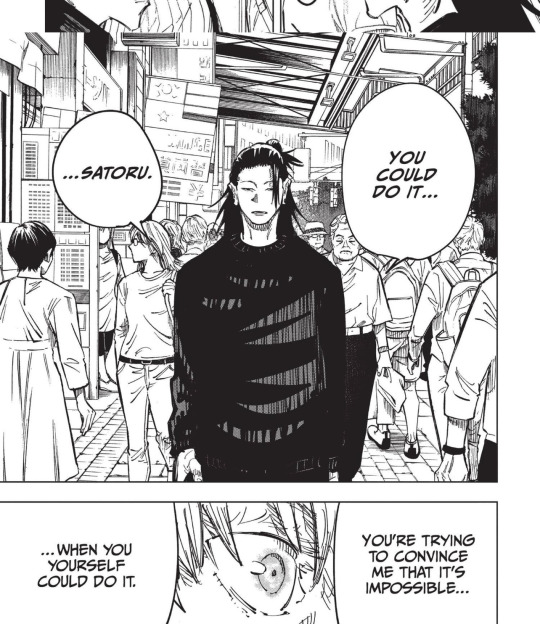
He wasn’t Gojo, who could do it if he wanted to.
Understanding that Gojo wasn’t, and accepting that he (Geto) shouldn’t change that about him (Gojo), as he was likely more suited to be at the school - essentially following nanami’s words and “leaving it to him” as Gojo was in his element / thrived on it, but Geto couldn’t be complicit in the system that would lead them to watch their own kind die one by one — Geto left to follow his ideals.
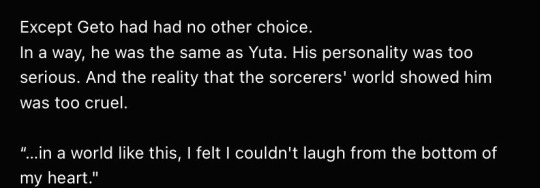
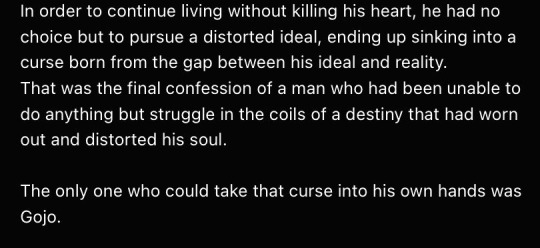
Gojo was referred to as the only one who can take that curse into his own hands. I used to see it as “the only one to kill Geto” after he failed and almost lost his humanity for the sake of power (killing Yuta would go against his principles) but now it also has a new meaning: the only one who can take charge and pursue the ideals to actually change the world.
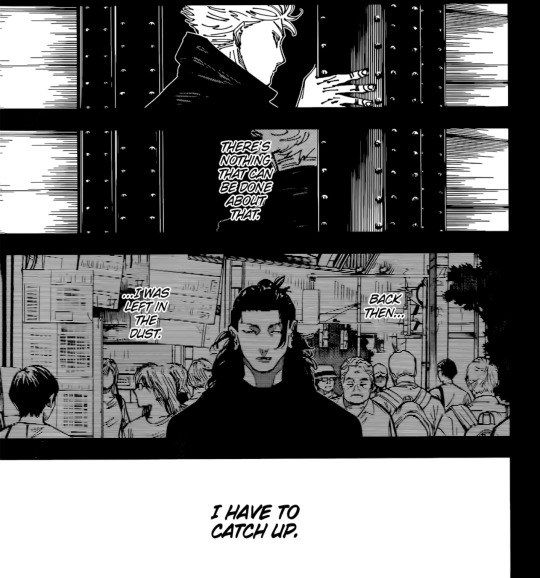
The curse is the sh*t that is in the world of sorcery in jjk. Gojo seemed to (imho) now feel the need to catch up and hold the reins this time.
It is the end of Resignation Man Gojo Satoru. The emergence of The Monster Gojo Satoru (who Geto assisted in helping Gojo keep at bay through being the “model of humanity” that Gojo could follow) who was then fully ready to take the stand. Like Geto on that stage.
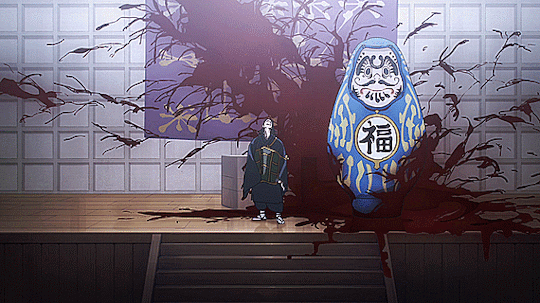
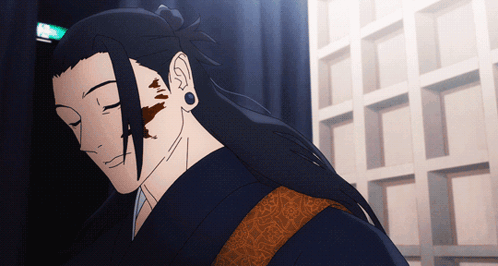
Bye higher ups.
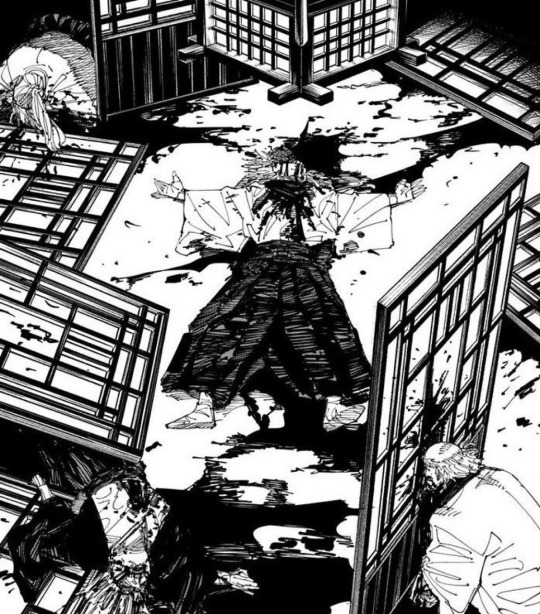
Before, despite his immense strength, he didn’t force his way through. Perhaps this was the outcome of having been forced to be born and live with no choice but to be the six eyes + limitless. You do not actually have freedom.
Unless, you’re willing to become a pariah. To wield these cards that were dealt to you and completely become the extraordinary.
And now, Yuta embraces the same resigned acceptance of becoming a monster. After all... only a few will be able and willing to turn into a Monster.
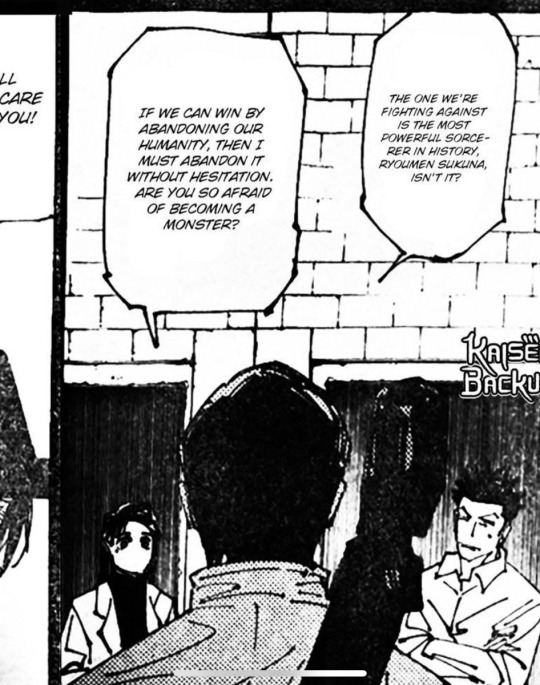
Out of love. A Monstrous love indeed.
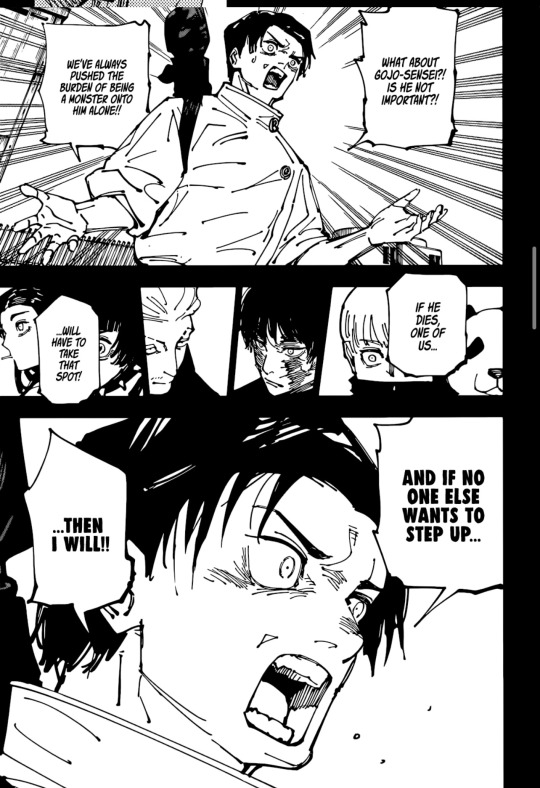
Geto had monstrous motherhood in him. I guess this extends to others now too. To cast away humanity because nobody else will. Nobody else can. So they have to wield it. Become it.
Yuta represents both the old and new world... in some way, he is like Gojo and Geto combined... power / strength + sincerity / kindness. Of course, like the yin and yang, each half has a bit of the other in it - so Gojo and Geto had a combination of power and compassion, but they symbolically represent each,
Arguably, had Geto someone else by his side, things may have been different.
All of this mess… ugh.
It didn’t have to come to this, right? Nor did it have to be the extermination of humans, but it could’ve been a collaboration of the special grades (Yuki, Gojo, Geto) all trying to solve the 3 different factors to the problem: humans as the origin of curses (research), the old-fashioned higher ups + clans, and the elimination of the curses. There may be others, but you get my gist.
But alas, this is the jjk world.
Just some thoughts, I’ll end it here before it’s more word vom.
#gojo resignation man#jjk#jjk 261#jjk leaks#jjk analysis#jjk thoughts#satosugu#jujutsu kaisen#gojo satoru#stsg#geto suguru#jjk spoilers#jjk Yuta#jujutsu kaisen analysis#jujutsu kaisen theories#gojo analysis#yuta okkotsu#jujutsu kaisen spoilers#jjk angst#jjk meta#jujutsu kaisen thoughts#jjk brainrot
235 notes
·
View notes
Text
The Inconspicuous Writing Gem: Daeran’s Look-alike Contest Breakdown

The Dance of Masks brought the long-anticipated last hurrah to the Knight Commander’s story. Although it was announced that the DLC would focus on the companions, I wasn’t holding my breath for substantial content that would actually enrich the characters’ plots. The game is already massive and has a ton of variables, so expecting the writers to continue storylines that can have multiple outcomes would be unreasonable. But one scene far exceeded my expectations and set the bar high for the rest of the expansion, rendering me more critical about some of its elements than I would normally be. The event in question may not appear as much, but the true artistry in writing stories driven by the player’s choice fully reveals itself in what we don’t see on the surface. Daeran’s look-alike contest varies greatly, depending on how his personal quest was resolved, and, therefore, serves as a semi-epilogue to his arc. I wanted to post an analysis of his character’s progression for quite some time, and this send-off is a fitting opportunity to delve into this matter. I’ll break down the differences in the new scene as well as in a few others and share my overall thoughts on what this addition brings to the table. Brace yourself because it’s going to be long.
I'll start with a quick reminder of what Daeran’s questline outcomes are, because I'm going to reference them a lot:
Good, in which he’s openly grateful to the Knight Commander despite having to face the tribunal, and Liotr, noticing their bond, intervenes so the Inquisition doesn't lock him up;
Lobotomy, in which Daeran reluctantly accepts his predicament of having to face the trial, Liotr doesn't support him and after the crusade, the Count is sent to the asylum and lobotomized;
HappyEvil, in which the Commander kills Liotr to secure Daeran’s freedom;
ArchEvil, in which Daeran doesn't have any trust in the Commander, feels deserted and murders Liotr to avoid the trial.
At first glance, there's nothing profound about Daeran’s festival quest — it fits his image to indulge in the vain act of self-celebration by choosing the most accurate imitation of himself. However, this simple setup proves itself clever when we realize that, by observing the contestants, he sees himself in a distorting mirror. Coincidentally, each participant appears to represent a different facet of the Count’s character. Therefore, his reactions to them speak volumes of the self-image and mindset he developed during the crusade in each scenario.
Among the doubles, we have an aasimar who mimics Daeran's arrogance and cruelty, and constantly interrupts other participants' speeches with mocking remarks.
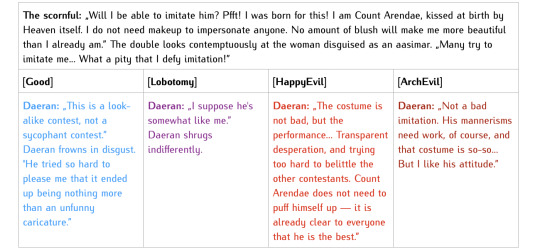
A woman who recreates Daeran's sophisticated bon vivant persona.

A drunkard who paints Daeran as a worthless and utterly unapologetic rake.

And finally, an innocent boy who keeps staring at Daeran with admiration and portrays him as a virtuous hero of the crusade.

After the presentation of the contestants is over, Daeran asks the Commander’s opinion. Again, his responses to their verdict vary in each case (unless they choose the cat), but the difference in how he reacts to being compared to the little boy is the most telling.
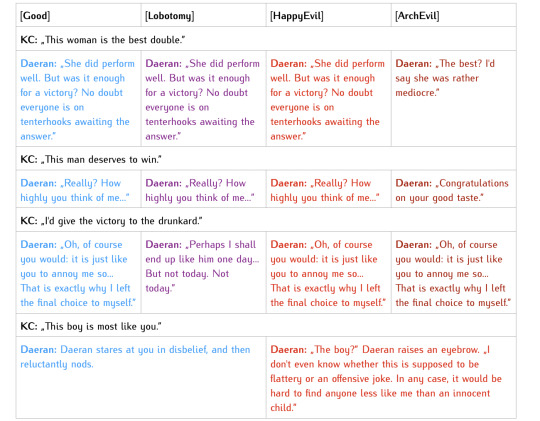
No matter what the protagonist suggests, the winner of the contest is fixed for each of the outcomes. If the Commander failed to earn Daeran's trust and he murdered Liotr himself, the conceited aasimar is declared the winner.

If the Commander killed Liotr, the Count awards the lady.

If the quest was resolved peacefully (either Good or Lobotomy), Daeran chooses the boy and has a heartwarming exchange with him.

This variety of possible scenarios and the way they are handled encapsulate why I consider Daeran's story so intricately woven and enjoyable to analyze. He's an incredibly flexible and dynamic character whose potential endings range from becoming a saint to a homicidal maniac. But what makes this duality and everything that comes in between so engaging is that all these vastly contradictory conclusions are equally organic and convincing, given his rich characterization and the player’s choices. The subtle yet significant divergences in the narrative paths maintain the integrity of his personality and prevent his evolution from seeming far-fetched while efficiently showcasing his growth or regression.
Regretfully, this attention to detail is missing from the other new scenes, which don't convey a similar sense of progression and can come off as somewhat disconnected from the rest of the playthrough. The rendezvous, for example, avoids references to how the player concluded Daeran's romance and quest. Given these plotlines' non-linearity, it's an understandable approach, but it prevents the scene from exploring deeper themes and hitting more emotional notes. What's particularly detrimental to the its overall intensity is the absence of exclusive dialogue for the True Love outcome. Ironically, it's the two worst endings that get unique and surprisingly heartfelt lines.
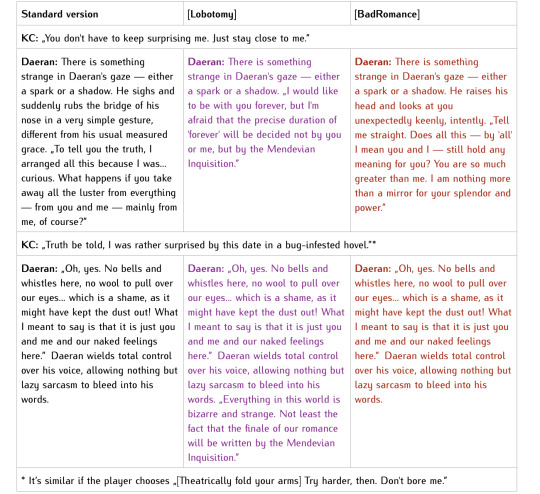
The difference is insignificant, however, because the conversation always plays out the same. All in all, the segment is nice and leaves a lot to the imagination, but only partially exploits its potential. Meanwhile, the festival mini-quest embraces the aforementioned strengths of the storyline's writing, giving every iteration of Daeran distinct dialogues that clearly demonstrate the impact the crusade and acquaintance with the Commander had on him.
I won't examine every dialogue branch in detail but will mainly focus on the Good scenario. As someone who likes this ending the best and even advocates the controversial writing in the final confrontation with Liotr, I always thought the narrative failed to properly sell its implied benefits. Apart from the closing conversation in the quest itself, late-game provides little reactivity to differentiate the outcomes, making it hard for the players to fully grasp the internal shift that Daeran undergoes. Comparison of said dialogue in various scenarios reveals his perspective in Good route as the least egocentric and overall most mature. Unfortunately, in an individual playthrough, these qualities can get overshadowed by the Count's dissatisfaction with the inconveniences he will eventually have to endure.

Aside from that, the effects of each resolution manifest only in Daeran's responses to one question in the romantic route and how he expressed his feelings regarding Galfrey’s death.
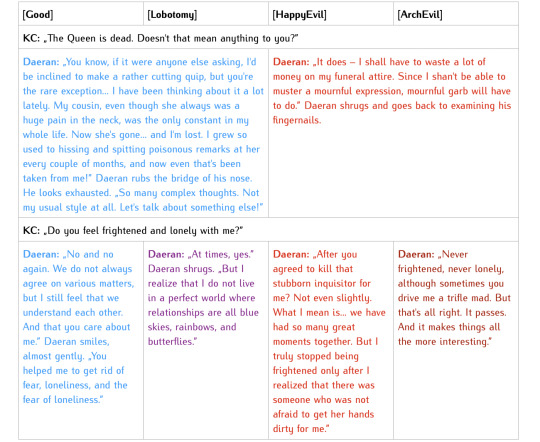
Even though they show evident contrast and serve as a much-needed emotional pay-off for the moral dilemma the player faced in the storyline finale, both are relatively minor, with the Queen one completely missable in most playthroughs. When combined with the similar omission of negative repercussions for Daeran’s moral condition and emotional maturity in other outcomes, it's not surprising many players believe he doesn’t ever change or that becoming better fundamentally clashes with his nature.
The discussed competition scene remedies the narrative’s deficiencies, ultimately proving this statement untrue. In the Good outcome, Daeran presents a reasonable dose of self-distance. When confronted with the drunk’s insults, he replies with humor and courtesy, which is a stark contrast to his reactions in the Evil outcomes and his past responses to criticism. Despite being hurt by the harsh judgment, he understands such a low opinion of himself is somewhat justified. The Count's mild response and his sensitivity to the suggestion that he's nothing more than an unfeeling scoundrel may even indicate that he has developed some remorse for his past actions. He also dismisses unwarranted flattery and distances himself from the brash egotism. All without falling into a spiral of gloom and self-deprecation that occurs in the Lobotomy scenario. Introspectiveness and vulnerability showcased here are a seamless continuation of the self-evaluation Daeran does in the High Trust version of his quest upon being supposedly betrayed by the Commander.
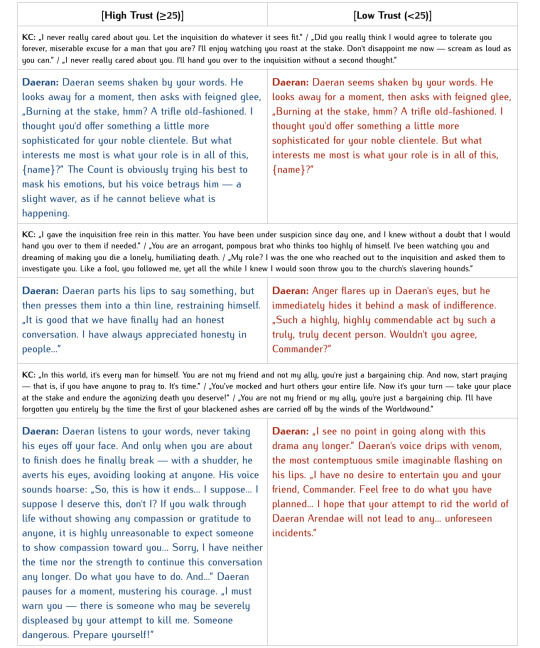
It's all the more unfortunate that the other interactions in the DLC don’t acknowledge these differences and instead return to the common denominator of all endings. As a result, the player will go from Daeran, who self-reflects and claims the aasimar presents an unfunny caricature of him, to Daeran in the tavern, who puffs himself up exactly like the guy (using even the same words) and seeks more sycophantic praise. While it's expected for him to put on an airy act and tease others, the absolute lack of self-awareness he previously exhibits in the Good route is quite jarring. Considering the complexity of the storyline as well as all sorts of limitations, such inconsistencies are inevitable (the base game already has a fair share of them) and in the end, one can easily reconcile them through their own interpretations. However, after being spoiled by a reactivity treat like the festival mini-quest, it's disappointing that the remaining dialogues lack similar nuance.
In the Good scenario, Daeran's behavior reinforces what we learn in the epilogue — that in this version, he has the most difficulty navigating through his newfound freedom and redefining himself in it. Choosing the winner of a silly contest shouldn't be hard for him, and it isn't in the Evil outcomes. There, the self-satisfied Count (who in both cases already has the blood of at least one innocent man on his hands) picks what he perceives as an idealized version of himself — be it the aestheticized depiction of his self-centredness or the unbridled and unyielding haughtiness. Noteworthily, in the Happy variant, Daeran openly flirts with the lady and, in both Evil paths, if not romanced, attempts to seduce his favored contestant. It’s peak narcissism, given the implications of the scene. In the peaceful outcomes, especially the Good one, the ordeal is a series of unpleasant self-reflections that even causes him to become overwhelmed by sorrow at one point. In the end, Daeran’s choice stems not from an ulterior motive or a desire to boost his ego but from genuine fondness for the boy. The youngster's belief in the Count’s kindness and heroism reminds him of his own innocence that was prematurely and brutally snatched from him. At his core, Daeran is not a self-sufficient master of his own fate but a helpless child thrown by unfortunate circumstances into otherworldly oppression and a vicious cycle of selfishness. In the Evil routes, he successfully deludes himself into believing he’s the former, but here, he realizes he’s the latter.
We're used to seeing Daeran scoffing at saccharine narratives and lofty ideals, and in the Evil versions, he's indeed annoyed with the boy’s portrayal of him. In one of them, he even anticipates him to be disenchanted, finding the prospect amusing. In the campaign's early stages, the Count voices his dissatisfaction with being enrolled in the crusade and laments the tarnishing of his ill reputation. Any suggestions that he may be secretly vulnerable are met with biting retorts. But now, Daeran doesn't disabuse the child and isn’t even bothered by being seen as a heroic figure. There also isn’t any objection when the Commander points out the similarity between him and the boy. He’s shocked they can see through him but decides to be honest and agrees with their assessment. Daeran’s sensitivity and his tendency to be more emotionally transparent with the protagonist is, at this point, a recurring theme in the peaceful outcomes, so it’s a shame that when they later choose to compliment his vulnerable soul, he's always equally dismissive.
Daeran is perfectly aware of how damaging cruel disillusionment can be to one’s psyche. As a child, he witnessed firsthand the powerlessness of good in the face of evil, the suffering adhering to moral principles can bring, and how those who claim to be righteous can turn out to be as callous and uncaring as hardened villains. These experiences left the young Count with a pessimistic view of the world and human nature, making him adopt coping mechanisms that only deepened his melancholy and loneliness. Knowing this, he wishes to spare the boy a similar fate and plays along to preserve his innocence.
In the non-peaceful outcomes, Daeran gives the signet away as if it was an insignificant bauble. But even though we barely ever see this side of him, some dialogues indicate he’s proud of his heritage and his ancestors' role in Mendev’s history. They were valiant defenders of the kingdom, who, for generations, protected its borders from any threat. This is who the Count, as a scion of the Arendae house, was originally destined to be and who, it so happens, the boy sees in him. Perhaps his take on him makes Daeran reflect on how differently things could have turned out had it not been for his family's demise and the Other’s interference. It undoubtedly revokes memories of his roots and deceased kin, since he not only rewards the child with the ring but also educates him on its meaning and sentimental value, expressing unexpected sincerity and kindness. In the Lobotomy scenario, this gesture is particularly bittersweet — with his impeding childless death, Daeran’s lineage is going to expire, making the memento the only way to keep its memory alive.
Finally, the Good version of the scene carries a deep symbolic significance. Daeran rewards one person who doesn't focus on his superficial traits or recreates the mask he hides behind. The image the boy paints of him may not be accurate, but while the other portrayals embody what the Count turned into under the Other's influence, this one shows what he could have been if he hadn’t lost the childish naivety he now longs for. And who he, despite his own skepticism, still can or perhaps even already started to become, thanks to the good protagonist's compassion and support. Just like the Commander, the boy views him as someone better than what his predicament forced him to be. And Daeran, confronted with sincere faith in him, cannot help but answer the call.
#pathfinder: wrath of the righteous#pathfinder wotr#pwotr#wotr#wrath of the righteous#owlcat games#daeran arendae#daeran#Дейран#my analysis
185 notes
·
View notes